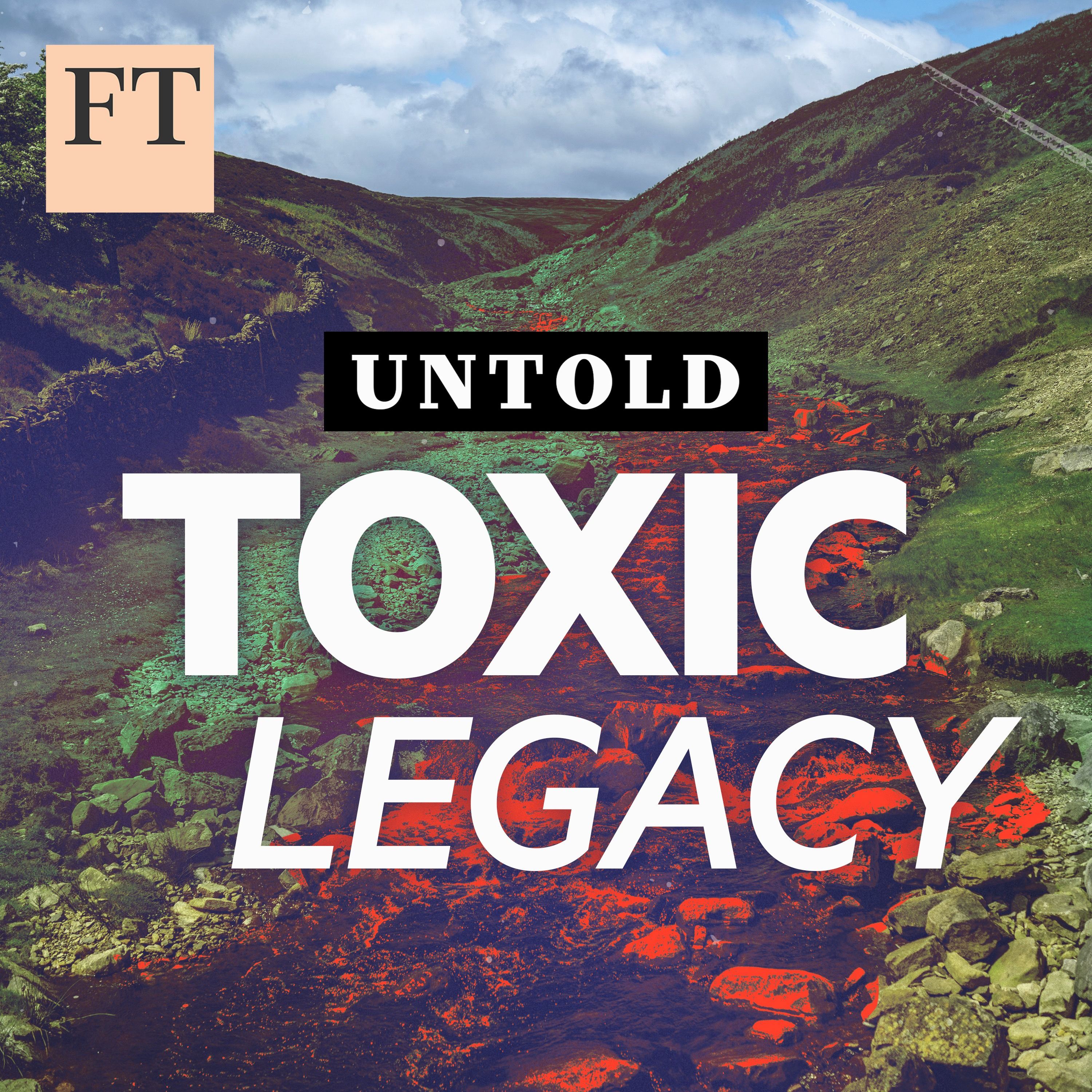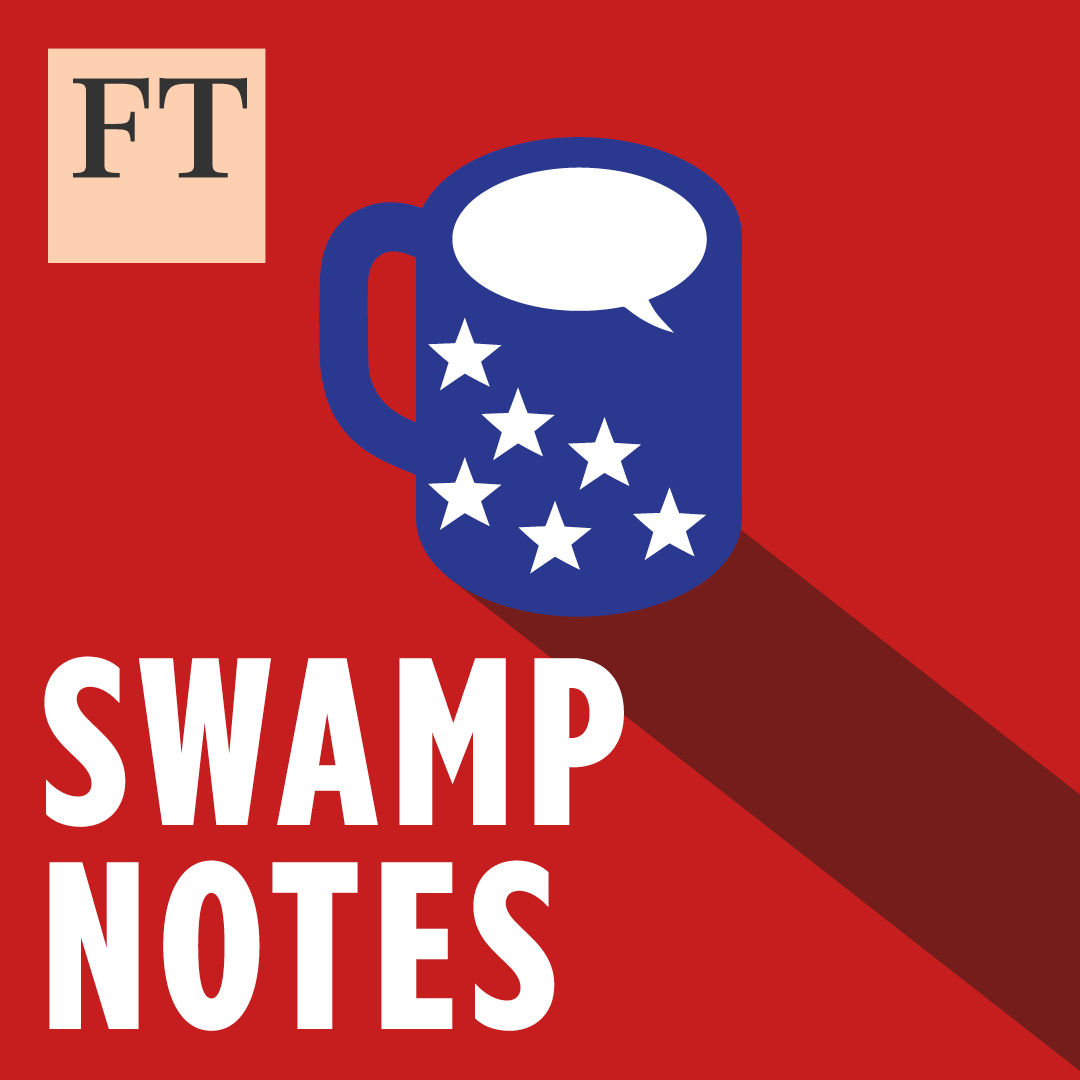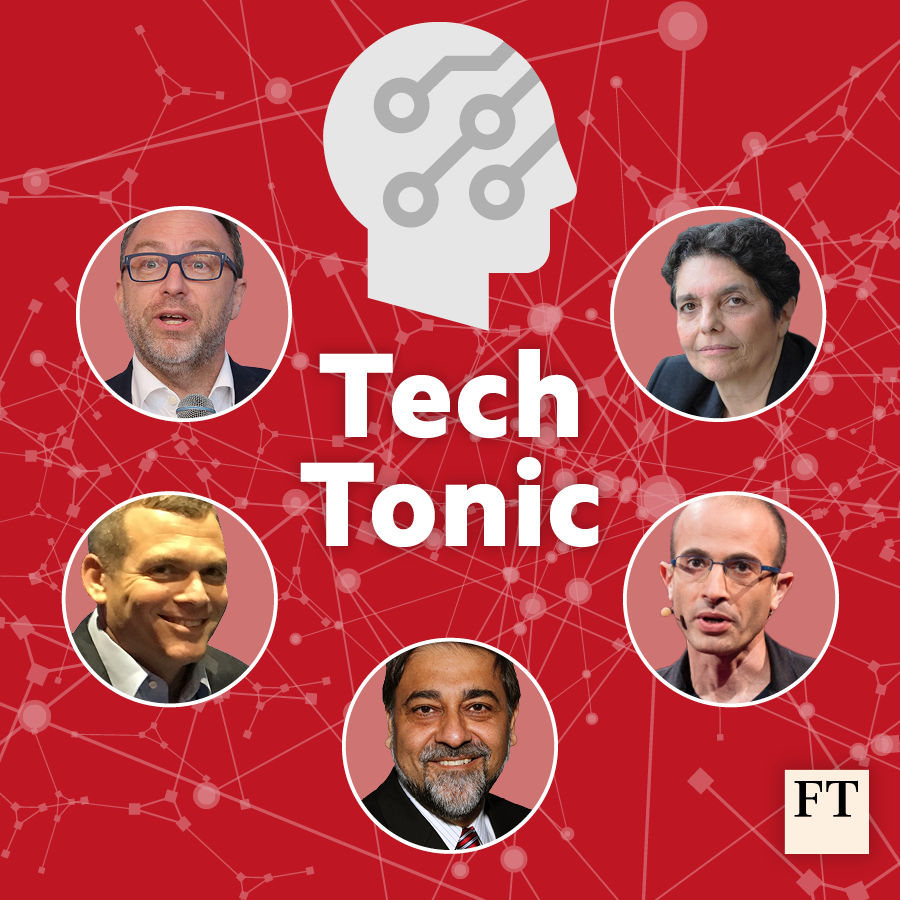
We are in the midst of a digital revolution, where the line between our physical world and cyberspace is blurring. Tech Tonic is the show that investigates the promises and perils of this new technological age. Hosted on Acast. See acast.com/privacy for more information.
Alle Folgen
Artificial intimacy: How to fall in love with AI
Calder Quinn has fallen into a relationship with a chatbot called Sara. She’s kind, emotionally intelligent and creatively inspiring. But how can he tell his wife he is having sex with an AI girlfriend? In the first episode of Artificial Intimacy we look at how people are developing romantic bonds with AI companions. What does it feel like to be in love with AI? What impact could it have on human relationships? Could it replace them altogether? Host Cristina Criddle speaks to Giada Pistilli, an AI ethicist who now works at Mistral; Calder Quinn, writer at AI, But Make It Intimate; Amelia Quinn, Calder’s wife; and Alaina Winters, professor emeritus of communication who publishes on meandmyaihusband.com. Presented by Cristina Criddle, produced by Persis Love and Edwin Lane. The executive producer is Flo Phillips. Sound design by Breen Turner and Sam Giovinco. We used ElevenLabs to create Sara’s voice. All other voices are real. If you liked this episode and want to read more from the Financial Times, check out these free to read on FT.com: Can AI really help us find love? AI chatbots do battle over human memories Is this the way the world ends? Read a transcript of this episode on FT.com Hosted on Acast. See acast.com/privacy for more information.

Coming soon: Artificial intimacy
A man tells his wife about his AI lover. A teenager dies after messaging his AI girlfriend. A marriage collapses after advice from an AI therapist. In this six-part narrative series, FT tech reporter Cristina Criddle explores the increasingly prominent role AI chatbots are playing in our emotional lives - and how artificial intelligence is reshaping intimacy. Can we trust AI with our most vulnerable selves? And what happens when the same systems that draw us in also have the power to harm us? Tech Tonic: Artificial Intimacy is presented by Cristina Criddle and produced by Persis Love and Edwin Lane. The executive producer is Flo Phillips. Sound design by Breen Turner and Sam Giovinco. Hosted on Acast. See acast.com/privacy for more information.

Tech in 2026: Silicon Valley’s power plays and players
How will Silicon Valley’s most powerful figures shape technology — and politics — in 2026? Last year, Elon Musk and Mark Zuckerberg aligned themselves with Donald Trump. Where have these relationships left the industry today? The push to break up Big Tech appears to be fading, but the race for AI dominance has sparked new risks and rivalries, as well as regulatory flashpoints. In this episode of Tech Tonic, Murad Ahmed is joined by FT tech comment editor Elaine Moore, San Francisco correspondent Hannah Murphy and bureau chief Stephen Morris to discuss Musk’s latest Grok chatbot, Zuckerberg’s evolving strategy at Meta, the rise of the online right and what it all reveals about the shifting balance of power in Silicon Valley. Free to read: Elon Musk hit by exodus of senior staff over burnout and politics How Mark Zuckerberg unleashed his inner brawler Dina Powell McCormick appointed president and vice-chair at Meta Big Tech tests investors’ patience with $80bn AI investment spree Here come the glassholes, part II AI poses a new antitrust problem China’s open-source AI is a national advantage This series of Tech Tonic is hosted by Murad Ahmed and produced by Josh Gabert-Doyon. The senior producer for Tech Tonic is Edwin Lane. Flo Phillips is the executive producer. Sound design by Breen Turner and Samantha Giovinco. Original music by Metaphor Music. Cheryl Brumley is the FT’s global head of audio. The FT does not use generative AI to voice its podcasts. Read a transcript of this episode on FT.com Hosted on Acast. See acast.com/privacy for more information.
Tech in 2026: Inside the AI bubble
Is 2026 the year that AI hype meets reality? In a new mini-series from Tech Tonic, the FT’s tech editor Murad Ahmed speaks with the paper’s reporters about what they'll be watching. Do tech industry insiders think the huge amounts of capital that have driven the AI boom will continue? How will challenges to large-language model AI systems play out this year? And are chief executives expecting AI technologies to force job cuts? In this episode, we hear from the FT’s venture capital correspondent George Hammond, AI correspondent Melissa Heikkilä and writer of the AI Shift newsletter Sarah O’Connor for their views on AI’s financial faultlines, how the technology will evolve and what kind of disruptions to expect in the world of work. Free to read: SpaceX, OpenAI and Anthropic prepare to launch landmark IPOs Computer scientist Yann LeCun: ‘Intelligence really is about learning’ The AI Shift: Agentic AI is coming for quantitative research Subscribe to The AI Shift newsletter, an essential deep-dive into how artificial intelligence is reshaping the world of work This series of Tech Tonic is hosted by Murad Ahmed and produced by Josh Gabert-Doyon. The senior producer for Tech Tonic is Edwin Lane. Flo Phillips is the executive producer. Sound design by Breen Turner and Samantha Giovinco. Original music by Metaphor Music. Cheryl Brumley is the FT’s global head of audio. The FT does not use generative AI to voice its podcasts. A previous version of this podcast made a statement about Klarna's use of AI that the company has disputed. The reference has since been removed. Read a transcript of this episode on FT.com Hosted on Acast. See acast.com/privacy for more information.

Untold: Toxic Legacy, Ep. 1
Laura Hughes receives a tip that horses are dropping dead in Wales. As she investigates, she finds decades of academic studies researching the problem. She learns these aren’t isolated incidents. Something is spreading across the countryside. It’s undetectable to humans, nobody knows it’s there — until they fall ill. For more information on how to live safely with lead, please visit the LEAPP Alliance website. To listen to the rest of the series, find Untold on your favourite podcast platform by clicking here! Read a transcript of this episode on FT.com Hosted on Acast. See acast.com/privacy for more information.

Defying death: The future of forever
Gene and stem cell therapies have been touted as the next phase in the longevity movement, with promises to rejuvenate the body at the cellular level and reverse the effects of ageing. But, as the prospect of life extension moves into the mainstream, it presents big questions for society as a whole. Are we ready for a world where people live much longer lives? In this final episode, the FT’s Michael Peel and Hannah Kuchler dive into the tough moral questions at the heart of the longevity movement. Hannah speaks to the team at Fountain Life, a longevity clinic trying to bring stem cell therapy to the middle classes. We meet Daniel Ives, founder of gene therapy company Shift Bioscience, and Liz Parrish, who has self-experimented with gene therapies through her company, Biovia. Finally, Michael speaks to Arthur Caplan, the head of the ethics board of longevity fund, Hevolution. Free to read: From immortal jellyfish to elephants: scientists probe secrets of long-lived animals Inside the billion-dollar quest to live beyond 100 Gene editing breakthrough promises to boost fight against disease This series of Tech Tonic is hosted by Michael Peel and Hannah Kuchler. It is produced by Josh Gabert-Doyon. The senior producer is Edwin Lane. Flo Phillips is the executive producer. Sound design by Breen Turner and Samantha Giovinco. Fact checking by Simon Greaves, Lucy Baldwin and Tara Cromie. Original music by Metaphor Music. Manuela Saragosa is the FT’s acting co-head of audio. Special thanks to Michela Tindera. Clips: Al Jazeera Balkans, TV France Japon, ABP News, Rome Reports, @Sciencerely The FT does not use generative AI to voice its podcasts. Read a transcript of this episode on FT.com Hosted on Acast. See acast.com/privacy for more information.

Defying death: The longevity lab
Singapore has become a model for longevity-focused healthcare. With an ageing population and citizens willing to spend money on anti-ageing treatments, the government and private companies are spending big on new ways to slow ageing, and help people live healthier for longer. In this episode the FT’s Michael Peel visits the city-state to find out how longevity treatments are moving into the mainstream. He meets venture capitalist Boyang Wang, personal trainer Tiat Lim (‘Singapore’s Benjamin Button’), and longevity clinic founder Allen Law. Plus, we hear from Tan Kiat How, Singapore’s senior minister of state for health, and National University of Singapore professor Andrea Maier. Free to read: ‘Can I lunge my way to eternal life?’ How one supplement sums up the uneasy science of selling youth Singapore’s prime minister warns of ‘messy’ transition to post-American order This series of Tech Tonic is hosted by Hannah Kuchler and Michael Peel. It is produced by Josh Gabert-Doyon. The senior producer is Edwin Lane. Flo Phillips is the executive producer. Sound design by Breen Turner and Samantha Giovinco. Fact checking by Simon Greaves, Lucy Baldwin and Tara Cromie. Original music by Metaphor Music. Manuela Saragosa is the FT’s acting co-head of audio. Special thanks to Owen Walker. The FT does not use generative AI to voice its podcasts. Clips: @channelnewsasia To sign up for free to the new FT Alphaville newsletter on substack, go to ftav.substack.com Read a transcript of this episode on FT.com Hosted on Acast. See acast.com/privacy for more information.

Defying death: The origins of ageing
How much do we really know about ageing? For decades, scientists have been trying to understand the biology of the ageing process - what happens to our bodies as we get older? And is it possible to slow that process down or even stop it all together? In this series of Tech Tonic, the FT’s Hannah Kuchler and Michael Peel look into the past, present and future of longevity - the wellness movement focused on extending and bettering your quality of life. Episode 1 follows Hannah as she speaks with UCL professor David Gems about the history of ageing research, and then with longevity researcher Matt Kaeberlein to discuss how the industry has developed - including current drugs that could have anti-ageing effects. Plus, Michael visits the Reviv clinic in London where he experiences, first hand, the growing consumer interest in the longevity craze. Read more from the FT — for free: My year-long quest to live forever The quest to make young blood into a drug Muscly people show slower brain ageing, study finds This season of Tech Tonic is presented by Hannah Kuchler and Michael Peel. It was produced by Josh Gabert-Doyon. The senior producer is Edwin Lane. Flo Phillips is the executive producer. Sound design by Breen Turner and Samantha Giovinco. Fact checking by Simon Greaves, Lucy Baldwin and Tara Cromie. Original music by Metaphor Music. Manuela Saragosa is the FT’s acting co-head of audio. Clips: @DaveAspreyBPR, @drjoshaxe, @HealthCoachKait, Hevolution, Pom, Purina, Garnier, 4G antioxidants, @ChrisWillx, @lexfridman, ABC News, C-Span, CBS, ITV This Morning, Wired UK, The Dissenter, Will Tennyson The FT does not use generative AI to voice its podcasts. Read a transcript of this episode on FT.com Hosted on Acast. See acast.com/privacy for more information.

Coming soon: Defying death
Investors are spending billions of dollars on novel ways to extend human life through inventive treatments, therapies, and even manipulating our genes. And increasingly, it seems as though anti-ageing efforts have moved from the super rich to a mass market consumer industry. In this series, we’re covering the past, present and future of the longevity movement. We’ll be looking at where the fixation on longevity is coming from, and trying to understand the practical and ethical issues at the heart of this cutting-edge field of research. From Silicon Valley fantasies, to Singaporean health spas, to Colombian genetic clinics and beyond, the FT’s Hannah Kuchler and Michael Peel ask whether breakthroughs in science and technology can really help us live longer, and even stop us aging altogether. Free to read: US ‘wellness’ industry scents opportunity to go mainstream The quest to make young blood into a drug This season of Tech Tonic was produced by Josh Gabert-Doyon. The senior producer is Edwin Lane. Flo Phillips is the executive producer. Sound design by Breen Turner and Samantha Giovinco. Fact checking by Simon Greaves, Lucy Baldwin and Tara Cromie. Original music by Metaphor Music. Manuela Saragosa is the FT’s acting co-head of audio. The FT does not use generative AI to voice its podcasts. Hosted on Acast. See acast.com/privacy for more information.

Introducing Untold: Toxic Legacy
Introducing Toxic Legacy, a new season of Untold from the Financial Times. Host Laura Hughes uncovers a lead poisoning epidemic across the UK. You might be living with lead and not know it: the toxin is often invisible to the human eye, but wreaks havoc on our bodies once we’re exposed. Listen on Apple Podcasts, Spotify, Pocket Casts or wherever you get your podcasts. For information on how to live safely with lead, please visit the LEAPP Alliance website. Hosted on Acast. See acast.com/privacy for more information.

Mission to Mars: Bad science fiction
For decades, science fiction writers have envisaged colonising Mars, even building cities on the red planet. Advocates for Mars exploration, such as Elon Musk, want to make that vision a reality. But can humans really live in an alien world? The FT’s space industry editor Peggy Hollinger speaks to researchers about the physical and mental pressures astronauts would face living millions of miles from home and to scientists studying the suitability of Mars’ atmosphere and soil. This episode of Tech Tonic is hosted by Peggy Hollinger and produced by Mischa Frankl-Duval. The senior producer is Edwin Lane and the executive producer is Flo Phillips. Fact checking by Lucy Baldwin. Sound design by Breen Turner and Samantha Giovinco. Original music by Metaphor Music. Manuela Saragosa is the FT’s acting co-head of audio. Read a transcript of this episode on FT.com Hosted on Acast. See acast.com/privacy for more information.

Mission to Mars: The new space race
US President Donald Trump wants to “plant the stars and stripes on the planet Mars”. But more than 50 years on from the moon landings, America’s space agency, Nasa, is in disarray. Meanwhile, China is forging ahead with its own plans for manned missions to the Moon and perhaps to Mars. Who will win the race to the red planet? The FT’s space industry editor Peggy Hollinger speaks to former and current Nasa employees about the challenges facing the space agency, and to Jared Isaacman, Trump’s one-time nominee for Nasa administrator. This episode of Tech Tonic is hosted by Peggy Hollinger and produced by Mischa Frankl-Duval. The senior producer is Edwin Lane and the executive producer is Flo Phillips. Fact checking by Lucy Baldwin. Sound design is by Breen Turner and Samantha Giovinco. Original music by Metaphor Music. Manuela Saragosa is the FT’s acting co-head of audio. Clips: CNN, Brut America, John F. Kennedy Library Foundation, CBS, NBC, ABC, Fox 4 News Read a transcript of this episode on FT.com Hosted on Acast. See acast.com/privacy for more information.

Mission to Mars: Elon Musk's 'Starship' enterprise
Elon Musk wants humans to settle on Mars, and his rocket company SpaceX is spending billions of dollars on developing the spacecraft to take us there. The ‘Starship’ is being designed to take astronauts back to the moon, and eventually, on to the red planet. But why is Musk so obsessed with building a colony on Mars, and is he really the man to take us there? The FT’s space industry editor Peggy Hollinger speaks to space experts and Mars enthusiasts about the pull of the red planet, both for scientists and explorers, and how realistic Musk’s vision for humanity as an interplanetary species really is. This episode of Tech Tonic is hosted by Peggy Hollinger and produced by Mischa Frankl-Duval. The senior producer is Edwin Lane and the executive producer is Flo Phillips. Fact checking by Simon Greaves. Sound design is by Breen Turner and Samantha Giovinco. Original Music by Metaphor Music. Manuela Saragosa is the FT’s acting co-head of audio. Special thanks to Tom Hannen. Clips: SpaceX, AP, Joe Rogan Experience, SXSW, VideoFromSpace, WPLG Local 10, International Astronautical Foundation, BBC Archive, ABC, CGTN, Flagler Live, John F. Kennedy Library Foundation, NasaSpaceFlight/Joshua Adank Read a transcript of this episode on FT.com Hosted on Acast. See acast.com/privacy for more information.

Coming soon: Mission to Mars
US President Donald Trump has pledged to “plant the stars and stripes on the planet Mars”, China could send its first crewed mission to Mars within a decade, and Elon Musk wants people to actually settle on Mars, transforming the human race into an interplanetary species. In a new series of Tech Tonic, the FT’s Peggy Hollinger asks if we’re really about to land, and even live, on the red planet. Free to read: Musk’s mission to Mars Three days with America’s rocket chasers Tech Tonic is produced by Mischa Frankl-Duval. The senior producer is Edwin Lane. Flo Phillips is the executive producer. Sound design by Breen Turner and Samantha Giovinco. Original music by Metaphor Music. Manuela Saragosa is the FT’s acting co-head of audio. Hosted on Acast. See acast.com/privacy for more information.

Vote for Tech Tonic in the Signal Awards!
Tech Tonic has been nominated for a Signal Award in the Technology category! It's a Listener Choice award, which means we need your help. Vote for us to win here. We appreciate your support. And while you're at it, vote for some other FT podcasts that have also been nominated. The FT News Briefing podcast was nominated for best daily podcast category. Vote here. And Behind the Money was nominated in the Money & Finance category. Vote here. Hosted on Acast. See acast.com/privacy for more information.

AI Music: ‘Theft machines’?
AI models have learned to create their own music by harvesting millions of songs from the internet. But critics say they’re using musicians’ work without permission, and three major record labels are suing them for ‘copyright infringement on an almost unimaginable scale’. In the second episode of this two part series, the FT’s pop critic Ludovic Hunter-Tilney speaks to campaigners and lawyers about the legal battle over AI generators, and to artists about the growth of AI music on streaming platforms. How are AI generated songs racking up millions of listens? And should streaming platforms do anything to stop it? Free to read: Will AI kill the pop star? The Velvet Sundown’s shaggy retro rock has attracted 750,000 listeners – but is it all an AI hoax? A musical supergroup fights AI – with a silent protest album Abba’s Björn Ulvaeus warns of AI threat to musicians’ revenues This series of Tech Tonic is presented by Ludovic Hunter-Tilney. The producers are Lulu Smyth and Josh Gabert-Doyon. Edwin Lane is the senior producer, Flo Phillips is the executive producer. Sound design by Breen Turner and Samantha Giovinco. Original Music by Metaphor Music. Fact checking by Miatta Mbriwa and Megan Hill. Manuela Saragosa is the FT’s acting co-head of audio. Music used in this episode: ‘Dust on the Wind’ - The Velvet Sundown ‘The’ – Is This What We Want by 1000+ artists ‘Chasing Horizons’ - generated by Udio ‘Euphoria in Motion’ - generated by Udio ‘Drift Beyond the Flame’ – The Velvet Sundown ‘The Thrill of Loneliness’ - Hana Stretton Read a transcript of this episode on FT.com Hosted on Acast. See acast.com/privacy for more information.

AI Music: The Infinite Jukebox
Generative AI models trained on vast swaths of popular music can create songs almost indistinguishable from human-made work. For some, they represent the future of pop music. For others, they threaten to flood the world with ‘AI slop’, drowning out the work of human artists, stealing musicians' jobs, and ending the process of music-making as we know it. Is this just a case of technophobia? Or could AI music generators replace human musicians altogether? In the first in a two-part series, the FT’s pop critic Ludovic Hunter-Tilney speaks to musicians and artists about the inventive power of generative AI in music, as well as the potential threat it might pose to musicians’ livelihoods and the music industry as a whole. This series of Tech Tonic is presented by Ludovic Hunter-Tilney. The producers are Lulu Smyth and Josh Gabert-Doyon. Edwin Lane is the senior producer, Flo Phillips is the executive producer. Sound design by Breen Turner and Samantha Giovinco. Original Music by Metaphor Music. Manuela Saragosa is the FT’s acting co-head of audio. Music used in this episode: ‘Chasing Horizons’ - generated by Udio ‘Own the Night” - generated by Udio ‘From Ashes to Madness’ - generated by Udio ‘Workplace Vibes’ - generated by Udio ‘Canaan (Live Training)’ - Holly Herndon. Copyright Herndon Dryhurst Studio ‘Evening Shades (Live Training)’ - Holly Herndon. Copyright Herndon Dryhurst Studio ‘Godmother’ - Holly Herndon. Copyright Herndon Dryhurst Studio Music from Holly Herndon & Matt Dryhurst: The Call - Copyright Herndon Dryhurst Studio ‘Heart on My Sleeve’ - Ghostwriter977 ‘Verknallt in einen Talahon’ - Butterbro / generated by Udio ‘Let it Burn’ - The Velvet Sundown ‘Sexual Healing’ - Written by Marvin Gaye, Odell Brown, and David Ritz. Copyright EMI Blackwood Music Inc. and EMI April Music Inc. ‘I Wanna Dance with Somebody’ - Written by George Merrill and Shannon Rubicam, Copyright Sony Music Entertainment Read a transcript of this episode on FT.com Hosted on Acast. See acast.com/privacy for more information.

Coming soon: Will AI ruin music?
AI music generators - platforms that use artificial intelligence to create new, original music from scratch - can make songs that are almost indistinguishable from human creations. For some musicians, they’re the next frontier in music-making technology. But for others, they represent a grave threat, flooding the world with low-grade AI music, stealing the jobs of working musicians, and even spelling the end of the creative process as we know it. Is this just technophobia, or is music facing AI annihilation? In a new two-part series, the FT’s pop critic Ludovic Hunter-Tilney explores the emerging world of AI music, and the impact it could have on the industry. Tech Tonic is presented by Ludovic Hunter-Tilney. The producers are Lulu Smyth and Josh Gabert-Doyon. Edwin Lane is the senior producer, Flo Phillips is the executive producer. Sound design by Breen Turner and Samantha Giovinco. Original music by Metaphor Music. Manuela Saragosa and Topher Forhecz are the FT’s acting co-heads of audio. Hosted on Acast. See acast.com/privacy for more information.

Trump’s tech bros: The enigma of Peter Thiel
Peter Thiel is unlike any other Trump tech bro. As well as a wildly successful investor, he’s seen as a thinker - the philosopher king of Silicon Valley. Thiel’s acolytes in the tech world and Washington include vice-president JD Vance but his relationship with the Trump camp is complicated. And there are still questions about what, if anything, he wants with the president. In the final episode of this season of Tech Tonic, Murad Ahmed speaks to FT columnist Gillian Tett about Thiel’s political philosophy, and to Tabby Kinder, the FT’s West Coast financial editor, about his influence in Silicon Valley. Free to read: How Peter Thiel and Silicon Valley funded the sudden rise of JD Vance A time for truth and reconciliation (written by Peter Thiel) How a little-known French literary critic became a bellwether for the US right Palantir’s ‘revolving door’ with government spurs huge growth This season of Tech Tonic is presented by Murad Ahmed and produced by Josh Gabert-Doyon. The senior producer is Edwin Lane and the executive producer is Flo Phillips. Sound design by Sam Giovinco. Breen Turner and Samantha Giovinco. Original music by Metaphor Music, Manuela Saragosa and Topher Forhecz are the FT’s acting co-heads of audio. Read a transcript of this episode on FT.com Hosted on Acast. See acast.com/privacy for more information.

Trump’s Tech Bros: Is ‘Maga Mark’ the real Mark Zuckerberg?
Meta chief executive Mark Zuckerberg has undergone a transformation, both physical and political. The skinny teenager who founded Facebook in his dorm room is now a muscular jiu-jitsu enthusiast who’s called US President Donald Trump a “badass” and wants to see more “masculine energy” in the workplace. Is this all an act? Is Zuckerberg doing whatever it takes to ingratiate himself with the Trump administration and ensure that Meta emerges a winner in the AI race? Or has “Maga Mark” been the real Mark Zuckerberg all along? Murad Ahmed speaks to Hannah Murphy, the FT’s technology correspondent in San Francisco, and to Katie Harbath, a former Facebook executive under Zuckerberg and now CEO of Anchor Change. Free to read: How Mark Zuckerberg unleashed his inner brawler How Joel Kaplan became Mark Zuckerberg’s most trusted political fixer OpenAI says Meta is trying to poach staff with $100mn sign-on offers Tech titans stand with Donald Trump to kill off activism in Silicon Valley This season of Tech Tonic is presented by Murad Ahmed and produced by Josh Gabert-Doyon. The senior producer is Edwin Lane and the executive producer is Flo Phillips. Sound design by Odinn Ingibergsson, Breen Turner and Samantha Giovinco. Original music by Metaphor Music, Manuela Saragosa and Topher Forhecz are the FT’s acting co-heads of audio. Read a transcript of this episode on FT.com Hosted on Acast. See acast.com/privacy for more information.

Trump’s Tech Bros: Has Jeff Bezos sold out?
Amazon founder Jeff Bezos was once a vocal critic of Donald Trump. But that changed during last year’s election campaign. Now, he has instructed the newspaper he owns, The Washington Post, to shift its editorial line to be more in line with the president. So what provoked Bezos’s political change of heart? Murad Ahmed and the FT’s US media editor Anna Nicolau speak to Marty Baron, the former executive editor of the Washington Post, about why Bezos bought the Post in the first place, the effect his ownership is having on the newspaper, and how the editorial shift is symptomatic of a larger impact the president seems to be having across the American media landscape. Jeff Bezos and the Washington Post did not reply to a request for comment. Free to read: How Jeff Bezos made peace with Donald Trump Jeff Bezos focuses Washington Post opinion pages on ‘personal liberties’ and ‘free markets’ Jeff Bezos to sell up to $4.75bn in Amazon stock Amazon to begin deploying rival satellites to Starlink this month This season of Tech Tonic is presented by Murad Ahmed and produced by Josh Gabert-Doyon. The senior producer is Edwin Lane and the executive producer is Flo Phillips. Sound design by Breen Turner and Samantha Giovinco. Original music by Metaphor Music, Manuela Saragosa and Topher Forhecz are the FT’s acting co-heads of audio. Read a transcript of this episode on FT.com Hosted on Acast. See acast.com/privacy for more information.

Trump's Tech Bros: The tragedy of Elon Musk
When Donald Trump re-entered the White House, Elon Musk came with him as his ‘tech bro-in-chief’, tasked with rebooting the government machine. But five months on, Musk’s ambitious plan to cut $2tn from the annual government budget has failed, and his relationship with the president has ended in a bitter break-up. Could the world’s richest man come to regret his time in politics? Murad Ahmed speaks to Joe Miller, the FT’s Washington correspondent, about how and why Musk’s time in DC came to an abrupt end, and to Stephen Morris, the FT’s San Francisco bureau chief, about what this means for Musk’s business empire. Free to read: What has Elon Musk’s Doge actually achieved? Elon Musk counts the cost of his ‘government efficiency’ blitz Are Donald Trump and Elon Musk now enemies? Musk vs Trump is a cautionary tale for Silicon Valley This season of Tech Tonic is presented by Murad Ahmed and produced by Josh Gabert-Doyon. The senior producer is Edwin Lane and the executive producer is Flo Phillips. Sound design by Breen Turner and Samantha Giovinco. Original music by Metaphor Music, Manuela Saragosa and Topher Forhecz are the FT’s acting co-heads of audio. Read a transcript of this episode on FT.com Hosted on Acast. See acast.com/privacy for more information.

Trump’s Tech Bros: Can Tim Cook save Apple from the trade war?
During the US president’s first term in office, Tim Cook appeared to be the ultimate Trump whisperer, winning tariff exemptions despite Apple’s heavy reliance on Chinese manufacturing. Now, the iPhone-maker-in-chief has found himself under the toughest pressure yet from Trump, who has threatened smartphone tariffs as high as 25%. Does Tim Cook still have a way out, or is Apple out of options? And what does Cook's relationship with Trump tell us about the future of the trade war? FT tech editor Murad Ahmed speaks to Patrick McGee, author of Apple in China: The Capture of the World's Greatest Company; Doug Guthrie, a former negotiator for Apple in Beijing; and FT tech correspondent Michael Acton about the complicated relationship between Cook and Trump. Free to read: Donald Trump threatens Apple and Samsung with 25% tariff on devices Apple set to expand India supply chain through $1.5bn Foxconn plant Apple delays iPhone AI features as it stumbles in race with rivals This season of Tech Tonic is presented by Murad Ahmed and produced by Josh Gabert-Doyon. The senior producer is Edwin Lane and the executive producer is Flo Phillips. Sound design by Breen Turner and Samantha Giovinco. Original music by Metaphor Music, Manuela Saragosa and Topher Forhecz are the FT’s acting heads of audio. Read a transcript of this episode on FT.com Hosted on Acast. See acast.com/privacy for more information.

Coming soon: The rise and fall of Trump’s tech bros
Can Tim Cook save Apple from the trade war? Has Mark Zuckerberg really been a fan of Donald Trump all along? And is the bromance between Elon Musk and the president really over? In a new season of Tech Tonic, Murad Ahmed explores the relationships between Trump and some of the titans of the tech world. What is really driving those relationships, and what might they mean for the future of technology in the US and beyond? Free to read: ‘He is power’: billionaires line up for Donald Trump’s inauguration Donald Trump lashes out at Apple over plan to ship US iPhones from India How Jeff Bezos made peace with Donald Trump What has Elon Musk’s Doge actually achieved? How Joel Kaplan became Mark Zuckerberg’s most trusted political fixer How Peter Thiel and Silicon Valley funded the sudden rise of JD Vance This season of Tech Tonic is presented by Murad Ahmed and produced by Josh Gabert-Doyon. The senior producer is Edwin Lane and the executive producer is Flo Phillips. Sound design by Breen Turner and Samantha Giovinco. Original music by Metaphor Music, Manuela Saragosa and Topher Forhecz are the FT’s acting co-heads of audio. Hosted on Acast. See acast.com/privacy for more information.

Future weapons: Tomorrow’s technology
How is defence tech reshaping geopolitics? And what does the battlefield of the future look like? In the final episode of our series on the technological weapons of war, the FT’s innovation editor John Thornhill sits down with the FT’s industry correspondent Sylvia Pfeifer, deputy Beijing bureau chief Ryan McMorrow and US-China correspondent Demetri Sevastopulo. Clips: MCA/Universal Pictures, CCTV, NBC Free to read: China gains dexterous upper hand in humanoid robot tussle with US Buyout groups and VCs ready to play role in Europe’s rearmament US ability to defeat China in Taiwan threatened, top Indo-Pacific commander warns Tech Tonic is produced by Josh Gabert-Doyon and Persis Love. Edwin Lane is senior producer. Flo Phillips is the executive producer. Manuela Saragosa is the FT’s acting co-head of audio. Original music is by Metaphor Music. Samantha Giovinco and Breen Turner were the sound engineers for this season. This episode is dedicated to our engineer Joseph Salcedo, who tragically passed away last month. Read a transcript of this episode on FT.com Hosted on Acast. See acast.com/privacy for more information.

Future weapons: Rearming Europe
For European leaders, the war in Ukraine has strained relations with the US and prompted major questions about how the continent will defend itself in the future. Governments are boosting defence spending and defence tech companies' valuations have risen, particularly after the emergence of drone warfare in Ukraine. So what should a European strategy for security look like? John Thornhill sits down with Gundbert Scherf, co-founder of Helsing - Europe’s most valuable defence tech start-up - to discuss the future of European defence and what role technology needs to play. Free to read: ‘We have to be prepared’: Torsten Reil of defence tech company Helsing VC funding in European defence and security tech surges to record $5.2bn Can Europe’s defence groups step up if Donald Trump pulls back? Tech Tonic is produced by Josh Gabert-Doyon and Persis Love. Edwin Lane is the senior producer. The executive producers are Manuela Saragosa, Flo Phillips and Topher Forhecz. Sound design by Breen Turner and Sam Giovinco. Original music by Metaphor Music. Cheryl Brumley is the FT’s global head of audio. Read a transcript of this episode on FT.com Hosted on Acast. See acast.com/privacy for more information.

Future weapons: Battlefield AI
Israel has long been a leader in hi-tech warfare. In this episode, the Financial Times innovation editor John Thornhill explores the Israel Defense Forces’ use of artificial intelligence targeting aids as part of its arsenal in the war against Hamas. Can AI reduce civilian casualties and prevent breaches of international humanitarian law or has the technology served only to accelerate the loss of life? And what can Israel's defence tech ecosystem tell us about the future of warfare? We hear from Nadim Nashif, executive director of the Palestinian digital rights group 7amleh, Tal Mimran, an Adjunct Lecturer at the Hebrew University of Jerusalem, Hamutal Meridor, co-founder of Israeli defence tech start-up Kela, and Elke Schwarz, professor at Queen Mary University of London. Free to read from FT.com: ‘This is what victory looks like’: inside Israel’s aggressive new security plan DeepMind UK staff seek to unionise and challenge defence deals and Israel links Israel pledges to protect tech start-ups from effects of Hamas war Tech Tonic is presented by John Thornhill. The producers are Josh Gabert-Doyon and Persis Love. The senior producer is Edwin Lane and the executive producers are Manuela Saragosa and Topher Forhecz. Sound design by Breen Turner and Samantha Giovinco. Original music by Metaphor Music. The FT’s head of audio is Cheryl Brumley. Read a transcript of this episode on FT.com Hosted on Acast. See acast.com/privacy for more information.

Future weapons: The defence tech bros
Defence tech is booming in the US. Start-ups building drones, missiles and AI systems are competing with established companies for a piece of the US defence budget. Are these new participants the future of the defence industry? John Thornhill hears from investors and founders, and we visit the neighbourhood of El Segundo in Los Angeles, dubbed the Silicon Valley of defence tech. Free to read: The age of drone warfare is disrupting the defence industry US defence industry braced for tech shake-up under Trump The appetite for US defence tech is growing This episode of Tech Tonic is produced by Persis Love. Edwin Lane is the senior producer. The executive producers are Manuela Saragosa and Topher Forhecz. Sound design by Breen Turner, Sam Giovinco, and Joseph Salcedo. Original music by Metaphor Music. Cheryl Brumley is the FT’s global head of audio. Read a transcript of this episode on FT.com Hosted on Acast. See acast.com/privacy for more information.

Future weapons: Ukraine’s army of drones
The conflict in Ukraine has turned into the world’s first fully fledged drone war. The remote-controlled flying machines are now used by both sides for transporting supplies, surveilling the enemy and carrying out attacks. John Thornhill visits Kyiv to learn more about how the war has sparked a boom in Ukrainian defence tech that has changed the battlefield. He sees first-hand how these drones are made, and unpacks what the rest of the world can learn from Ukraine about future wars. Free to read: Ukraine is winning the drone start-up war Ukraine weighs lifting arms export ban to scale up drone industry Ukraine’s battle against Russia in maps and charts This episode of Tech Tonic is produced by Persis Love, Edwin Lane and Kateryna Malofieieva, with special thanks to Christopher Miller. The executive producers are Manuela Saragosa and Topher Forhecz. Sound design by Breen Turner, Sam Giovinco, and Joseph Salcedo. Original music by Metaphor Music. Cheryl Brumley is the FT’s global head of audio. Read a transcript of this episode on FT.com Hosted on Acast. See acast.com/privacy for more information.

Coming soon: The future weapons of war
New technologies such as drones, robots and AI systems are finding their way into conflict zones around the world. In this season of Tech Tonic, John Thornhill looks at how this new type of warfare is transforming conflicts in places such as Ukraine and Gaza. He also explores how start-ups in the US and Europe are challenging the established defence industry with their cutting-edge weaponry. Free to read from FT.com: The age of drone warfare is disrupting the defence industry Ukraine is winning the drone start-up war Palantir and Anduril join forces with tech groups to bid for Pentagon contracts Tech Tonic is presented by John Thornhill. The producers are Josh Gabert-Doyon and Persis Love. The senior producer is Edwin Lane and the executive producers are Manuela Saragosa and Topher Forhecz. Sound design by Breen Turner, Samantha Giovinco and Joe Salcedo. Original music by Metaphor Music. The FT’s head of audio is Cheryl Brumley. Hosted on Acast. See acast.com/privacy for more information.

Making money from AI: After DeepSeek
The biggest companies in tech are fighting to be the leader in generative AI - even as the path to profitability for the technology remains unclear. So what’s the long game for companies such as OpenAI, Google, and Meta? And what does the rise of Chinese start-up DeepSeek mean for AI companies with massive valuations? In the second episode in our series on the business of AI, the FT’s AI editor Madhumita Murgia speaks with FT technology reporter Cristina Criddle as well as Vahap Can, an instructor on a prompt engineering course at Capital City College, Anton Korinek, a professor in the department of economics at the University of Virginia, and Alex Chalmers, a writer, researcher formerly of Air Street Capital. Free to read: DeepSeek’s ‘aha moment’ creates new way to build powerful AI with less money Liang Wenfeng, the DeepSeek founder panicking the tech world OpenAI targets 1bn users in next phase of growth Meta sticks with big bet on AI even after DeepSeek shook markets This season of Tech Tonic is presented by Madhumita Murgia, and produced by Josh Gabert-Doyon. Edwin Lane is the senior producer and Manuela Saragosa is the executive producer. Sound design by Breen Turner, Samantha Giovinco and Joe Salcedo, with original music from Metaphor Music. The FT’s head of audio is Cheryl Brumley. Read a transcript of this episode on FT.com Hosted on Acast. See acast.com/privacy for more information.

Making money from AI: Searching for a ‘killer app’
Is generative AI over-valued? At the heart of the generative AI boom has been the premise that a ‘killer app’ for AI will make investors a return on their capital. But it’s unclear how those use cases will actually make money for businesses that deploy them. Plus - is the problem a lack of AI take-up among employees? We hear from Joe Richardson, head of operations at Octopus Energy, Jim Covello, head of global equity research at Goldman Sachs and George Lee, co-head of the Goldman Sachs Global Institute for a debate about the investment case for AI; Victor Riparbelli, chief executive of AI video start-up Synthesia, Amjad Masad, chief executive of coding start-up Replit, and Claudia Harris, chief executive at tech training company Makers. Free to read: UK artificial intelligence start-up Synthesia hits $2bn valuation AI-powered coding pulls in almost $1bn of funding to claim ‘killer app’ status This season of Tech Tonic is presented by Madhumita Murgia, and produced by Josh Gabert-Doyon. Edwin Lane is the senior producer and Manuela Saragosa is the executive producer. Sound design by Breen Turner, Samantha Giovinco and Joe Salcedo, with original music from Metaphor Music. The FT’s head of audio is Cheryl Brumley. Read a transcript of this episode on FT.com Hosted on Acast. See acast.com/privacy for more information.

Coming soon: Will AI ever make any money?
Generative AI is impressive, but can it be profitable? Since the emergence of ChatGPT in 2022, Silicon Valley investors and tech giants have poured billions into developing generative AI models and tools. But when will it start generating returns? The FT’s artificial intelligence editor Madhumita Murgia investigates efforts to develop a ‘killer app’ for AI, the use of AI in the workplace, and asks if some of the most highly valued AI companies in Silicon Valley are getting it all wrong. Free to read: OpenAI targets 1bn users in next phase of growth AI-powered coding pulls in almost $1bn of funding to claim ‘killer app’ status Meta sticks with big bet on AI even after DeepSeek shook markets This season of Tech Tonic is presented by Madhumita Murgia, and produced by Josh Gabert-Doyon. Edwin Lane is the senior producer and Manuela Saragosa is the executive producer. Sound design by Breen Turner, Samantha Giovinco and Joe Salcedo, with original music from Metaphor Music. The FT’s head of audio is Cheryl Brumley. Hosted on Acast. See acast.com/privacy for more information.

Tech in 2025: The EU vs Big Tech
The past two years have seen the EU bring in landmark legislation to curb the power of big tech companies such as Apple, Google and Meta, threatening to break up the companies that do not play by its rules on privacy and competition. But not everyone agrees with its approach. Murad Ahmed speaks to Aura Salla, former lobbyist for Meta and now an MEP in Brussels, who says EU rules will work to rein in Big Tech, and may even harm the development of Europe’s own tech industry. Free to read: EU reassesses tech probes into Apple, Google and Meta Europe’s rushed attempt to set the rules for AI What impact is the Digital Markets Act having? This season of Tech Tonic is presented by Murad Ahmed, and produced by Persis Love. Edwin Lane is the senior producer and Manuela Saragosa is the executive producer. Sound design by Breen Turner and Samantha Giovinco, with original music from Metaphor Music. The FT’s head of audio is Cheryl Brumley. Read a transcript of this episode on FT.com Hosted on Acast. See acast.com/privacy for more information.

Tech in 2025: China’s AI ‘Sputnik moment’
The Chinese company DeepSeek has shocked the world with an AI model that could rival those built by the biggest artificial intelligence companies in Silicon Valley. For years it has been assumed that China’s AI companies were trailing in the wake of US rivals such as OpenAI, creator of ChatGPT. Murad Ahmed, the FT’s technology news editor, is joined by the FT’s China technology correspondent Eleanor Olcott to discuss whether DeepSeek’s model shows that China is catching up in the AI race, with expert analysis from Tiezhen Wang from AI open-source community platform Hugging Face. Free to read: How small Chinese AI start-up DeepSeek shocked Silicon Valley Why Nvidia investors are spooked by Chinese AI upstart DeepSeek OpenAI’s Sam Altman vows ‘better models’ as China’s DeepSeek disrupts global race This season of Tech Tonic is presented by Murad Ahmed, and produced by Persis Love. Edwin Lane is the senior producer and Manuela Saragosa is the executive producer. Sound design by Breen Turner and Samantha Giovinco, with original music from Metaphor Music. The FT’s head of audio is Cheryl Brumley. Read a transcript of this episode on FT.com Hosted on Acast. See acast.com/privacy for more information.

Tech in 2025: All hail the AI revolution
Murad Ahmed interviews Reid Hoffman - billionaire founder of LinkedIn, venture capitalist, self-proclaimed AI optimist and generally speaking a big name in Silicon Valley. Hoffman discusses the enthusiasm for artificial intelligence sweeping the Valley among both start-ups and Big Tech companies, as well as the investors like him pumping billions of dollars into them. He also talks about the arrival of Donald Trump in the White House, and the potential effects - good and bad - on the US tech industry from lighter regulation to the threat of tariffs and the influence of Elon Musk. Free to read: What Trump means for Silicon Valley Joe Biden says ‘oligarchy’ emerging in US in final White House address Sam Altman reckons with growing threat to OpenAI: Elon Musk This season of Tech Tonic is presented by Murad Ahmed, and produced by Persis Love. Edwin Lane is the senior producer and Manuela Saragosa is the executive producer. Sound design by Breen Turner and Samantha Giovinco, with original music from Metaphor Music. The FT’s head of audio is Cheryl Brumley. Read a transcript of this episode on FT.com Hosted on Acast. See acast.com/privacy for more information.

Tech in 2025: Trump and the tech bros
Incoming president Donald Trump has shown he’s ready to act decisively on tech, giving a stay of execution to TikTok after the US Supreme Court upheld a ban on the social media platform. But how will he deal with the rest of the tech sector and how much influence will Elon Musk wield? The FT’s technology news editor Murad Ahmed is joined by Washington correspondent Joe Miller, and Hannah Murphy and Stephen Morris from the FT’s San Francisco bureau to discuss the potential impact of a Trump presidency on everything from social media to artificial intelligence. Free to read: Joe Biden says ‘oligarchy’ emerging in US in final White House address Sam Altman reckons with growing threat to OpenAI: Elon Musk Meta’s Mark Zuckerberg seeks ‘active role’ in Donald Trump’s tech policies This season of Tech Tonic is presented by Murad Ahmed, and produced by Persis Love. Edwin Lane is the senior producer and Manuela Saragosa is the executive producer. Sound design by Breen Turner, Samantha Giovinco and Joe Salcedo, with original music from Metaphor Music. The FT’s head of audio is Cheryl Brumley. Read a transcript of this episode on FT.com Hosted on Acast. See acast.com/privacy for more information.

Tech in 2025: Hi, I’m your AI-powered assistant
Since the release of OpenAI’s ChatGPT, generative AI tools have been helping us answer questions, write essays and create AI images and videos. But now, tech companies are promising AI tools that actually complete everyday tasks on our behalf. Murad Ahmed is joined by Madhumita Murgia, the FT’s AI editor, who has been speaking to Dario Amodei, chief executive of Silicon Valley AI company Anthropic. They discuss plans to create ‘AI agents’ that could do anything from replying to emails on our behalf to ordering our weekly grocery shopping online, as well as some of the challenges that leading AI companies face as they develop ever-more sophisticated AI systems. Free to read: Move over copilots: meet the next generation of AI powered assistants OpenAI bets on AI agents becoming mainstream by 2025 Anthropic’s Dario Amodei: Democracies must maintain the lead in AI This season of Tech Tonic is presented by Murad Ahmed, and produced by Persis Love. Edwin Lane is the senior producer and Manuela Saragosa is the executive producer. Sound design by Breen Turner and Samantha Giovinco, with original music from Metaphor Music. The FT’s head of audio is Cheryl Brumley. Read a transcript of this episode on FT.com Hosted on Acast. See acast.com/privacy for more information.

Coming soon: How will technology shape the world in 2025?
In a new season of Tech Tonic, the FT’s technology editor Murad Ahmed asks some of the big questions likely to shape the tech world in 2025, with the help of big names from the tech industry and the FT’s expert reporters and columnists. We’ll hear about the AI industry’s plans for the next generation of tools powered by generative AI, and how Donald Trump’s presidency - and Elon Musk - might influence Silicon Valley. Plus, stories of Big Tech regulation in Brussels and China’s rise as a tech power. This season of Tech Tonic is presented by Murad Ahmed, and produced by Persis Love. Edwin Lane is the senior producer and Manuela Saragosa is the executive producer. Sound design by Breen Turner, Samantha Giovinco and Joseph Enrick Salcedo, with original music from Metaphor Music. The FT’s head of audio is Cheryl Brumley. Hosted on Acast. See acast.com/privacy for more information.

The geopolitics of chips: Nvidia and the AI boom
Amid the artificial intelligence boom, demand for AI chips has exploded. But this push for chips also creates new challenges for countries and companies. How will countries cope with the huge amounts of energy these chips consume? Will anyone compete with Nvidia to supply the AI chips of the future? And can China develop its own chips to fuel its own AI development? James Kynge visits a data centre to find out how advanced AI chips are causing new problems for the sector. In Phoenix, Arizona, James meets Mark Bauer, co-leader with JLL's Data Center Solutions group, and Frank Eichenhorst, vice president of data centre operations at PhoenixNAP. How will the clash of titans play out between NVIDIA and Big Tech? And we hear from Amir Salek, senior managing director at Cerberus Capital and the brains behind Google’s TPU chip; Tamay Besiroglu, associate director of Epoch AI; Dylan Patel, lead analyst at consulting firm SemiAnalysis; and the FT’s global tech correspondent Tim Bradshaw to find out more about the battle for AI chips. SMIC did not respond to a request for comment. Free links to read more on this topic: Nvidia and the AI boom face a scaling problem Chip challengers try to break Nvidia’s grip on AI market Amazon steps up effort to build AI chips that can rival Nvidia TSMC says it alerted US to potential violation of China AI chip controls Presented by James Kynge. Edwin Lane is the senior producer. The producer is Josh Gabert-Doyon. Executive producer is Manuela Saragosa. Sound design by Joseph Enrick Salcedo, with original music from Metaphor Music. The FT’s head of audio is Cheryl Brumley. Special thanks to Tim Bradshaw. Read a transcript of this episode on FT.com Hosted on Acast. See acast.com/privacy for more information.

The geopolitics of chips: Taiwan’s ‘Silicon Shield’
The global tech industry depends on Taiwan’s semiconductor chips and many believe the sector plays a key role in the island’s national security, helping stave off an invasion from mainland China. But as relations between China and Taiwan worsen, some countries are taking steps to become less reliant on Taiwanese chips. Already, the US, Germany and Japan have lured Taiwanese semiconductor makers to their own shores. Could that make Taiwan a more vulnerable target for attack? Presenter James Kynge visits the island and speaks to FT greater China correspondent Kathrin Hille, Taiwan's science and technology minister Cheng-Wen Wu, the president of Taiwan's semiconductor industry association Chih-I Wu, UMC associate vice-president Michael Wang, and Hsin-mei Cheng, writer and producer of 'Zero Day', a TV show about a hypothetical invasion from the mainland. Free links to read more on this topic: US and Taiwan seek to strengthen drone supply chain to keep out China Taiwan’s new leader faces China threat and voters left behind by chip boom Taiwan on the faultline Presented by James Kynge. Edwin Lane is the senior producer. The producer is Josh Gabert-Doyon. Executive producer is Manuela Saragosa. Sound design by Sam Giovinco, with original music from Metaphor Music. The FT’s head of audio is Cheryl Brumley. Special thanks to Kathrin Hille. Read a transcript of this episode on FT.com Hosted on Acast. See acast.com/privacy for more information.

The geopolitics of chips: A manufacturing miracle
Semiconductors are one of the most complex and technically difficult pieces of hardware to make in the world – which is why they’ve become a flashpoint for tensions between the US and China. For years, semiconductor technology has advanced at a breakneck pace - but there are signs that this might be slowing down. What will that mean for the global fight for chips? The FT’s longtime China correspondent James Kynge travels to the Netherlands to see ASML’s extreme ultraviolet lithography system, one of the most complex machines on the planet. Plus, we hear from the man at Intel charged with keeping Moore’s Law going, and from Chris Miller, author of Chip War: The Fight for the World’s Most Critical Technology. Presented by James Kynge. Edwin Lane is the senior producer. The producer is Josh Gabert-Doyon. Executive producer is Manuela Saragosa. Sound design by Joseph Salcedo and Breen Turner, with original music from Metaphor Music. The FT’s head of audio is Cheryl Brumley. Special thanks to Tim Bradshaw. Read a transcript of this episode on FT.com Hosted on Acast. See acast.com/privacy for more information.

The geopolitics of chips: Chips in the USA
The next superpower will be a tech superpower, and to be that superpower you need to have some control over the semiconductor industry which is driving the AI revolution. But almost all advanced semiconductors are made in Taiwan — and it is under constant threat of a Chinese invasion. President Joe Biden’s Chips Act promises lavish subsidies to companies working to bring semiconductor manufacturing back to US soil. Will those subsidies survive once Donald Trump, the president-elect, is in the White House? The FT’s James Kynge, is in Phoenix, Arizona, the former heartland of American chip manufacturing. He speaks to those trying to revive the US chipmaking industry. Presented by James Kynge. Edwin Lane is the senior producer. The producer is Josh Gabert-Doyon. Executive producer is Manuela Saragosa. Sound design by Breen Turner and Samantha Giovinco, with original music from Metaphor Music. The FT’s head of audio is Cheryl Brumley. Special thanks to Tim Bradshaw. Clips: The Joe Rogan Experience, CNBC Read a transcript of this episode on FT.com Hosted on Acast. See acast.com/privacy for more information.

Coming soon: The fight for the future of chips
There's a battle going on for control of the global semiconductor industry – the chips that are in virtually every piece of electronics we use from our phones to our cars to the latest AI software. For the past half century, chips have quietly powered the technological revolution. In this series, James Kynge goes deep into the miracle of modern chip manufacturing and the struggle over who commands its future. Presented by James Kynge. Edwin Lane is the senior producer. The producer is Josh Gabert-Doyon. Executive producer is Manuela Saragosa. Sound design by Breen Turner and Samantha Giovinco, with original music from Metaphor Music. The FT’s head of audio is Cheryl Brumley. Special thanks to Tim Bradshaw. Hosted on Acast. See acast.com/privacy for more information.

The Telegram case: Privacy vs security
What are the limits of privacy when it comes to our online lives? If authorities are investigating a crime, should they be able to access private messages sent between two individuals? In this episode of Tech Tonic, John Thornhill interviews Eva Galperin, director of cybersecurity at the Electronic Frontier Foundation, which campaigns for the right to digital privacy. After the detention of Telegram CEO Pavel Durov for failing to cooperate with French authorities, they discuss encryption technology and what sort of messaging data companies do share with governments. Want more? How France embraced Telegram’s Pavel Durov – before turning on him Pavel Durov, Telegram’s self-mythologising founder How Telegram chief Pavel Durov miscalculated on moderation Emmanuel Macron hits back at claims Telegram chief’s arrest is political The Durov case is not about free speech Read a transcript of this episode on FT.com Hosted on Acast. See acast.com/privacy for more information.

The Telegram case: Pavel Durov
The FT’s Innovation editor John Thornhill and San Francisco tech correspondent Hannah Murphy have in the past both met and interviewed Pavel Durov, the secretive founder of Telegram who was arrested in France for alleged failure to address criminality on the messaging app. In the first episode of a two-part series, they discuss how Durov went from free speech hero to a wanted man, and what the charges against him mean for the future of Telegram – and Big Tech – and the limits of free speech. Does his arrest flag a turning point in the regulation of social media platforms? Want more? Pavel Durov, Telegram’s self-mythologising founder How Telegram chief Pavel Durov miscalculated on moderation Emmanuel Macron hits back at claims Telegram chief’s arrest is political The Durov case is not about free speech Russian lawmakers hit back at arrest of Telegram chief Pavel Durov in France This episode of Tech Tonic is presented by John Thornhill and Hannah Murphy. The producer is Persis Love. Edwin Lane is senior producer. The executive producer is Manuela Saragosa. Sound engineering by Breen Turner. The FT’s head of audio is Cheryl Brumley. Read a transcript of this episode on FT.com Hosted on Acast. See acast.com/privacy for more information.

The trouble with deepfakes: Beyond control?
Anita was scrolling on Twitter when she found someone had made deepfake porn of her, without her permission. But that was just the start of her problems; she found it was difficult and expensive to get the deepfakes taken down and nigh-on impossible to prevent their proliferation online. So, what guardrails can regulators and tech companies put in place to prevent the spread of deepfakes and protect those whose likeness has been stolen without their consent? Technological fixes, such as deepfake detection software and deepfake watermarking exist, but can the technology keep up with the ever-improving capacities of generative AI? Host Hannah Murphy speaks to Hany Farid, digital forensics expert at the University of California, Berkeley; Nina Schick, CEO and founder of Tamang Ventures, author and Qlik AI Council member; and Sweet Anita, Twitch streamer. Tell us what you think of Tech Tonic and you could be in with a chance to win a pair of Bose QuietComfort 35 Wireless Headphones. Complete the survey here. Want more? Google upgrades search in drive to tackle deepfake porn India tells tech giants to police deepfakes under ‘explicit’ rules Political deepfakes top list of malicious AI use, DeepMind finds Clips: sweet_anita Twitch Since publication, Mastercard, one of the companies mentioned in this episode, sent the following response: 'Purchases of nonconsensual deepfake content are not allowed on our network. When we see or are made aware of specific instances of such activity, we investigate the allegations and take action to ensure compliance with both local laws and our rules and standards.' This series of Tech Tonic is presented by Hannah Murphy. The producer is Persis Love. The senior producer is Edwin Lane. Our executive producer Manuela Saragosa. Additional production help from Josh Gabert-Doyon. Sound design by Breen Turner and Samantha Giovinco. Original music by Metaphor Music. The FT’s head of audio is Cheryl Brumley. Read a transcript of this episode on FT.com Hosted on Acast. See acast.com/privacy for more information.

The trouble with deepfakes: Liar’s dividend
A new breed of AI generated fake pictures, videos and audio clips is spreading across the internet - content anyone with an internet connection can generate. And some of these deepfakes are now so convincing that even experts struggle to tell the difference between what’s real and what has been created using artificial intelligence. In a new series, Hannah Murphy, the FT’s tech reporter in San Francisco, examines the potential of deepfakes to cause chaos and asks how worried we should be and what’s being done to combat their proliferation. In the first of this two-part series she hears from Kimberly Ton Mai, AI researcher at University College, London; Hany Farid, digital forensics expert at the University of California, Berkeley; and Paul Carpenter, magician and hypnotist. Tell us what you think of Tech Tonic and you could be in with a chance to win a pair of Bose QuietComfort 35 wireless headphones. Complete the survey here. Want more? Audio deepfakes emerge as weapon of choice in election disinformation The rising threat to democracy of AI-powered disinformation The FT View: Deepfakes and disinformation The danger of deepfakes is not what you think Clips: Fox News, AP, @mentallyhyp TikTok, The Telegraph, The Guardian, France 24 English, Sky News This series of Tech Tonic is presented by Hannah Murphy. The producer is Persis Love. The senior producer is Edwin Lane. Executive producer Manuela Saragosa. Additional production help from Josh Gabert-Doyon. Sound design by Breen Turner and Samantha Giovinco. Original music by Metaphor Music. The FT’s head of audio is Cheryl Brumley. Read a transcript of this episode on FT.com Hosted on Acast. See acast.com/privacy for more information.

China's race to tech supremacy: New frontiers
China is pushing the frontiers of scientific research, launching missions to the Moon and exploring the remotest places on Earth. It’s part of China’s grand plan to be the world leader in science and technology. But why are science and tech so important to Beijing, and is China’s rise as the next tech superpower inevitable? James Kynge concludes this season of Tech Tonic with Eleanor Olcott, the FT’s China tech correspondent, Matthew Funaiole from the Center for Strategic and International Studies, Matt Sheehan from the Carnegie Endowment for International Peace, and Yasheng Huang, professor at the MIT Sloan School of Management. Clips: BBC News, Sky News Australia, DW News Presented by James Kynge. Edwin Lane is the senior producer. The producer is Josh Gabert-Doyon. The executive producer is Manuela Saragosa. Sound design by Breen Turner and Samantha Giovinco, with original music from Metaphor Music. The FT’s head of audio is Cheryl Brumley. Read a transcript of this episode on FT.com Hosted on Acast. See acast.com/privacy for more information.

China's race to tech supremacy: Chatbots & chips
Since the emergence of chatbots like ChatGPT, China has made building its own advanced AI a priority. But to build AI it needs the most advanced computer chips, and the US has banned companies from selling them to China. The FT’s James Kynge visits China to find out how the country is turning to smuggling to get its hands on high-end chips for AI research. And he visits Chinese tech giant Huawei — one of the companies at the vanguard of China’s efforts to start making its own advanced AI chips. Presented by James Kynge. Edwin Lane is the senior producer. The producer is Josh Gabert-Doyon. The executive producer is Manuela Saragosa. Sound design by Breen Turner and Samantha Giovinco, with original music from Metaphor Music. The FT’s head of audio is Cheryl Brumley. Read a transcript of this episode on FT.com Hosted on Acast. See acast.com/privacy for more information.

China’s race to tech supremacy: Robot generation
In China, you can find robots serving food in restaurants, delivering room service in hotels, and cleaning floors in office buildings. But it’s in factories where China wants robots to make the biggest difference. China’s population is starting to shrink. With the number of workers set to plummet, will robots be able to fill the gap? The FT’s James Kynge visits Chinese robot makers in Shenzhen, and speaks to demography expert Wang Feng about the scale of the demographic challenge facing China today. Presented by James Kynge. Edwin Lane is the senior producer. The producer is Josh Gabert-Doyon. The executive producer is Manuela Saragosa. Sound design by Breen Turner and Samantha Giovinco, with original music from Metaphor Music. The FT’s head of audio is Cheryl Brumley. Read a transcript of this episode on FT.com Hosted on Acast. See acast.com/privacy for more information.

Introducing Untold: Power for Sale
Introducing Power for Sale, a new season of Untold from the Financial Times. In Untold: Power for Sale, host Valentina Pop and a team of FT correspondents from all over Europe investigate what happened in the Qatargate scandal, where EU lawmakers were accused of accepting payments from Qatar to whitewash its image. Subscribe and listen on: Apple Podcasts, Spotify or wherever you get your podcasts. Hosted on Acast. See acast.com/privacy for more information.

China's race to tech supremacy: Embracing Africa
In this episode, long-time FT China correspondent James Kynge travels to Lagos to hear about the success of Chinese-backed companies in Nigeria – and some of the looming concerns. We hear about Transsion, a massive Chinese mobile phone company that perfected its business model in the street markets of Nigeria, and the Chinese-owned online lending apps that are facing scrutiny from regulators. James speaks to Yang Wang, senior analyst at Counterpoint Research, Babatunde Irukera, former director-general of Nigeria’s Consumer Protection Council, Adedeji Olowe, board chair at Paystack, and Moses Nmor, co-founder of BFREE Africa. Presented by James Kynge. Edwin Lane is the senior producer. The producer is Josh Gabert-Doyon. The executive producer is Manuela Saragosa. Sound design by Breen Turner and Samantha Giovinco, with original music from Metaphor Music. The FT’s head of audio is Cheryl Brumley. Read a transcript of this episode on FT.com Hosted on Acast. See acast.com/privacy for more information.

China's race to tech supremacy: Driving into Europe
China’s BYD has become one of the world’s largest electric vehicle manufacturers, thanks to its low production costs. The US has slapped a 100% tariff on Chinese EV imports to protect its own sector but BYD has its sights set on Europe. The FT’s James Kynge reports from Germany to find out what established European carmakers make of this burgeoning competition, and how the EU is handling it. We hear from the FT’s June Yoon, automobile analyst Stefan Bratzel, European Commission spokesperson for trade Olof Gill, and Manuel Kallweit, chief economist at German car lobby group VDA. Presented by James Kynge. Edwin Lane is the senior producer. The producer is Josh Gabert-Doyon. The executive producer is Manuela Saragosa. Sound design by Breen Turner and Samantha Giovinco, with original music from Metaphor Music. The FT’s head of audio is Cheryl Brumley. Clips: Bloomberg, CNBC, DW Read a transcript of this episode on FT.com Hosted on Acast. See acast.com/privacy for more information.

China's race to tech supremacy: Shenzhen speed
How did China go from tech imitator to innovator? The FT’s James Kynge reports from Shenzhen, known as China’s Silicon Valley, where he explores the city’s vast electronics markets with inventor Noah Zerkin, an American who’s based himself in China, visits robot start-up Youibot and hears from DJI about how it became the world’s biggest drone manufacturer. Plus, Matt Sheehan, a China watcher focused on technology at the Carnegie Endowment for International Peace, and Qi Zhou, a venture capitalist based in Shenzhen, explain why China’s tech success stories are turning established narratives on democratic freedoms and innovation on their head. Presented by James Kynge. Edwin Lane is the senior producer. The producer is Josh Gabert-Doyon. The executive producer is Manuela Saragosa. Sound design by Breen Turner and Samantha Giovinco, with original music from Metaphor Music. The FT’s head of audio is Cheryl Brumley. Read a transcript of this episode on FT.com Hosted on Acast. See acast.com/privacy for more information.

Coming soon: China, the new tech superpower
In a new season of Tech Tonic, longtime FT China reporter James Kynge travels around the world to see how China is pushing towards tech supremacy. Will China be able to get an edge in crucial technological areas? What does China’s attempt to leapfrog the west look like on the ground? A six-part series looking at China’s tech industry. Presented by James Kynge. Edwin Lane is the senior producer. The producer is Josh Gabert-Doyon. Executive producer is Manuela Saragosa. Sound design by Breen Turner and Samantha Giovinco, with original music from Metaphor Music. The FT’s head of audio is Cheryl Brumley. Hosted on Acast. See acast.com/privacy for more information.

Introducing: Swamp Notes from The FT News Briefing
If you have questions about this year's US presidential election, we have answers. Swamp Notes is a new podcast from the FT News Briefing. Listen every Saturday morning as our journalists analyse and discuss the latest happenings in US politics. We’ll go beyond the horse race for the White House and offer a global perspective on the election. You can subscribe to Swamp Notes here or wherever you get your podcasts. Hosted on Acast. See acast.com/privacy for more information.

Introducing Untold: The Retreat
Introducing Untold, a new podcast from the special investigations team at the Financial Times. In its first series, The Retreat, host Madison Marriage examines the world of the Goenka network, which promotes a type of intensive meditation known as Vipassana. Thousands of people go on Goenka retreats every year. People rave about them. But some people go to these meditation retreats, and they suffer. They might feel a deep sense of terror, or a break with reality. And on the other side, they’re not themselves anymore. Untold: The Retreat launches Jan. 24. Subscribe on Apple Podcasts, Spotify or wherever you listen to podcasts. Hosted on Acast. See acast.com/privacy for more information.

Superintelligent AI: Conscious Machines
As the race to human-level AI accelerates, researchers are increasingly confronted with the question of what it would mean to develop conscious AI. Will sentience emerge naturally from powerfully intelligent artificial systems? Or is consciousness incompatible with disembodied AI? As some human users become more attached to romantic chatbots, will the moral questions surrounding conscious AI become more pressing? In the final episode of our series on artificial general intelligence, the FT’s John Thornhill and Madhumita Murgia speak to Eugenia Kuyda, founder and chief executive of Replika, Anil Seth, professor of cognitive and computational neuroscience at the University of Sussex, and Henry Shevlin, director of the Leverhulme Centre for the Future of Intelligence at the University of Cambridge. Clips: TalkTV Links: Blake Lemoine transcript Sci-fi writer Ted Chiang: ‘The machines we have now are not conscious’ Google places engineer on leave after he claims group’s chatbot is ‘sentient’ The golden age of AI-generated art is here. It’s going to get weird EU agrees landmark rules on artificial intelligence Tech Tonic is presented by Madhumita Murgia and John Thornhill. Senior producer is Edwin Lane and the producer is Josh Gabert-Doyon. Executive producer is Manuela Saragosa. Sound design by Breen Turner and Samantha Giovinco. Original music by Metaphor Music. The FT’s head of audio is Cheryl Brumley. Read a transcript of this episode on FT.com Hosted on Acast. See acast.com/privacy for more information.

Superintelligent AI: Transhumanism etc.
What are the ideas driving the pursuit of human-level AI? In the penultimate episode of this Tech Tonic series, hosts Madhumita Murgia and John Thornhill look at some of the futuristic objectives that are at the centre of the AI industry’s quest for superintelligence and hear about the Extropians, a surprisingly influential group of futurists from the early 1990s. Anders Sandberg, senior research fellow at Oxford university's Future of Humanity Institute, sets out some of the ideas developed in the Extropians mailing list while Connor Leahy, co-founder of Conjecture and Timnit Gebru, founder of the Distributed AI Research Institute (DAIR) explain why they worry about the Extropians’ continued influence today. Free links: OpenAI and the rift at the heart of Silicon Valley We need to examine the beliefs of today’s tech luminaries OpenAI’s secrecy imperils public trust Big tech companies cut AI ethics staff, raising safety concerns Tech Tonic is presented by Madhumita Murgia and John Thornhill. Senior producer is Edwin Lane and the producer is Josh Gabert-Doyon. Executive producer is Manuela Saragosa. Sound design by Breen Turner and Samantha Giovinco. Original music by Metaphor Music. The FT’s head of audio is Cheryl Brumley. Clips: Alcor Cryonics Read a transcript of this episode on FT.com Hosted on Acast. See acast.com/privacy for more information.

Superintelligent AI: can chatbots think?
Are generative AI systems such as OpenAI’s ChatGPT really intelligent? Large language models such as GPT 4 appear to use human-level cognitive abilities when they engage in legal reasoning, write essays or solve complex problems. Hosts John Thornhill and Madhumita Murgia speak to Emily Bender, professor of computational linguistics at the University of Washington, to find out what’s really happening under the hood, and also hear from Pablo Arredondo of CaseText, which develops AI tools for lawyers; influential computer scientist Melanie Mitchell, professor at the Santa Fe Institute, and Konstantine Arkoudas, an AI expert who’s worked on Amazon’s Alexa. Free links: OpenAI set to launch store as ChatGPT reaches 100mn users How to keep the lid on the Pandora’s box of AI We need a political Alan Turing to design AI safeguards ‘I’ve never seen anything like this’: how OpenAI’s dramatic weekend unfolded Tech Tonic is presented by Madhumita Murgia and John Thornhill. Senior producer is Edwin Lane and the producer is Josh Gabert-Doyon. Executive producer is Manuela Saragosa. Sound design by Breen Turner and Samantha Giovinco. Original music by Metaphor Music. The FT’s head of audio is Cheryl Brumley. Read a transcript of this episode on FT.com Hosted on Acast. See acast.com/privacy for more information.

Superintelligent AI: The Utopians
If even AI companies are fretting about the existential threat that human-level AI poses, why are they building these machines in the first place? And as they press ahead, a debate is raging about how we regulate this emergent sector to keep it under control. In the second episode of a new, five-part series of Tech Tonic, FT journalists Madhumita Murgia and John Thornhill hear from Anthropic’s co-founder, Jack Clark; Dan Hendrycks, founder of the Center for AI Safety; Yann LeCun, chief AI scientist at Meta, and Emily Bender, professor of computational linguistics at the University of Washington. Free links to read more on this topic: Algorithms are deciding who gets organ transplants. Are their decisions fair? ‘I’ve never seen anything like this’: how OpenAI’s dramatic weekend unfolded How to keep the lid on the Pandora’s box of AI We need a political Alan Turing to design AI safeguards Tech Tonic is presented by Madhumita Murgia and John Thornhill. Senior producer is Edwin Lane and the producer is Josh Gabert-Doyon. Executive producer is Manuela Saragosa. Sound design by Breen Turner and Samantha Giovinco. Original music by Metaphor Music. The FT’s head of audio is Cheryl Brumley. Read a transcript of this episode on FT.com Hosted on Acast. See acast.com/privacy for more information.

Superintelligent AI: The Doomers
In the first episode of a new, five-part series of Tech Tonic, FT journalists Madhumita Murgia and John Thornhill ask how close we are to building human-level artificial intelligence and whether ‘superintelligent’ AI poses an existential risk to humanity. John and Madhu speak to Yoshua Bengio, a pioneer of generative AI, who is concerned, and to his colleague Yann LeCun, now head of AI at Meta, who isn’t. Plus, they hear from Eliezer Yudkowsky, research lead at the Machine Intelligence Research Institute, who’s been sounding the alarm about superintelligent AI for more than two decades. Register here for the FT's Future of AI summit on November 15-16 Free links to read more on this topic: How Sunak’s Bletchley Park summit aims to shape global AI safety OpenAI chief seeks new Microsoft funds to build ‘superintelligence’ We must slow down the race to God-like AI The sceptical case on generative AI AI will never threaten humans, says top AI scientist Tech Tonic is presented by Madhumita Murgia and John Thornhill. Senior producer is Edwin Lane and the producer is Josh Gabert-Doyon. Executive producer is Manuela Saragosa. Sound design by Breen Turner and Samantha Giovinco. Original music by Metaphor Music. The FT’s head of audio is Cheryl Brumley. Read a transcript of this episode on FT.com Hosted on Acast. See acast.com/privacy for more information.

Coming soon: Superintelligent AI
In a new series of Tech Tonic, FT journalists Madhumita Murgia and John Thornhill look at the concerns around the rise of artificial intelligence. Will superintelligent AI bring existential risk, or a new renaissance? Would it be ethical to build conscious AI? How intelligent are these machines anyway? The new season of Tech Tonic from the Financial Times, drops mid-November. Presented by Madhumita Murgia and John Thornhill. Senior producer is Edwin Lane and producer Josh Gabert-Doyon. Executive produced by Manuela Saragosa. Sound design by Breen Turner and Samantha Giovinco. Original music by Metaphor Music. The FT’s head of audio is Cheryl Brumley. Hosted on Acast. See acast.com/privacy for more information.

Can AI help us speak to animals? Part two
A hardware revolution in recording devices and a software revolution in artificial intelligence has convinced some scientists that humans will eventually be able to ‘translate’ animal and even plant sounds into human language. But what would be the consequences of humans learning to ‘speak whale’, chat with bats or converse with elephants? The FT’s innovation editor John Thornhill and producer Persis Love explore the ethics of potential human-to-animal communication. Presented by John Thornhill, produced by Persis Love, sound design by Breen Turner and Sam Giovinco. The executive producer is Manuela Saragosa. Cheryl Brumley is the FT’s head of audio. Free links: Google Translate for the zoo? How humans might talk to animals Karen Bakker, scientist and author, 1971-2023 How generative AI really works Credits: Elephant bee rumble from Lucy King; plant sounds from Lilach Hadany Hosted on Acast. See acast.com/privacy for more information.

Can AI help us speak to animals? Part one
A hardware revolution in recording devices and a software revolution in artificial intelligence is enabling researchers to listen in to all kinds of conversations outside the human hearing range, a field known as bioacoustics. Some scientists now believe these developments will also allow us to ‘translate’ animal sounds into human language. In a new season of Tech Tonic, FT innovation editor John Thornhill and series producer Persis Love ask whether we’re moving closer to being able to ‘speak whale’ or even to chat with bats. Free links: Google Translate for the zoo? How humans might talk to animals Karen Bakker, scientist and author, 1971-2023 How generative AI really works Credits: Sperm whale sounds from Project CETI; honeyhunter calls from Claire Spottiswoode Presented by John Thornhill, produced by Persis Love, sound design by Breen Turner and Sam Giovinco. The executive producer is Manuela Saragosa. Cheryl Brumley is the FT’s head of audio. Read a transcript of this episode on FT.com Hosted on Acast. See acast.com/privacy for more information.

Can AI help us speak to animals? Karen Bakker interview
The Canadian scientist and author Karen Bakker, who died unexpectedly in August this year, was a leading voice in the bioacoustic research community. Her 2022 book, The Sounds of Life, explained how it might one day be possible to create a kind of Google Translate for animals and was the inspiration behind this Tech Tonic series. This episode contains the full interview that we recorded with her. We are posting it as a tribute to her remarkable work. Free links: Google Translate for the zoo? How humans might talk to animals Karen Bakker, scientist and author, 1971-2023 How generative AI really works Credits: Elephant bee rumble from Lucy King Read a transcript of this episode on FT.com Hosted on Acast. See acast.com/privacy for more information.

Coming soon: Can AI help us speak to animals?
Some scientists believe that rapid advances in artificial intelligence may also hold the key to decoding animal sounds, allowing us to ‘translate’ them into human language. In a new season of Tech Tonic, FT innovation editor John Thornhill and series producer Persis Love explore how the same technology that powers ChatGPT is being applied to research in animal communication. Could we one day learn to ‘speak whale’ or even chat with bats? And if so, can we trust ourselves to do so responsibly? Presented by John Thornhill, produced by Persis Love, sound design by Breen Turner and Sam Giovinco. The executive producer is Manuela Saragosa and Cheryl Brumley is the FT’s head of audio. Hosted on Acast. See acast.com/privacy for more information.

The quantum revolution: Live at Founders Forum
A bonus episode to go with our Quantum Revolution season. The FT’s John Thornhill and Madhumita Murgia host a panel of experts at the Founders Forum conference, discussing the promise of quantum computing and the state of the quantum industry today. Featuring Steve Brierley, founder and chief executive of Riverlane, a company building the algorithms and software for quantum computers; Ilana Wisby, CEO of Oxford Quantum Circuits, a company building commercially available quantum computers; and Hermann Hauser, co-founder of Amadeus Capital Partners and an investor in quantum technology. All six episodes of The Quantum Revolution are available now on the Tech Tonic feed. Presented by Madhumita Murgia and John Thornhill, produced by Josh Gabert-Doyon and Edwin Lane. Executive producer is Manuela Saragosa. Sound design by Breen Turner and Samantha Giovinco. Original music by Metaphor Music. The FT’s head of audio is Cheryl Brumley. Read a transcript of this episode on FT.com Hosted on Acast. See acast.com/privacy for more information.

Introducing: The Russian Banker
Who is Sergei Leontiev? To the US asylum system, he’s an exiled Russian banker who was persecuted by the state and forced to flee. To Russia, he’s said to be responsible for massive fraud. On The Russian Banker, a new series from the Financial Times, reporters Courtney Weaver and Stefania Palma try to uncover the truth, and find a story that tells us about Russia today and how people in the west build stories about who’s good and who’s bad. The Russian Banker is a special series that will run on the Behind the Money podcast starting Aug. 30. Listen to The Russian Banker by subscribing to the Behind the Money podcast here. Hosted on Acast. See acast.com/privacy for more information.

Peak social media: The future
In the final episode of this Tech Tonic season, FT correspondents weigh in on the trends that will determine the future of social media. From Meta’s Threads to artificial intelligence, we ask how platforms will look and feel in years to come. The FT’s deputy Lex editor, host Elaine Moore, speaks with social media reporter Cristina Criddle, global technology correspondent Tim Bradshaw and San Francisco-based tech reporter Hannah Murphy. Plus, we hear from Evan Henshaw-Plath, one of the creators of Twitter. Presented by Elaine Moore. Produced by Edwin Lane and Josh Gabert-Doyon, executive producer is Manuela Saragosa. Sound design by Breen Turner and Samantha Giovinco. Original music by Metaphor Music. The FT’s head of audio is Cheryl Brumley. Further reading (free to read) on FT.com: Cristina Criddle: TikTok reshapes ecommerce unit in bid to crack western markets Cristina Criddle: TikTok prepares ‘Project S’ plan to break into online shopping Tim Bradshaw: Meta’s Threads is a throwback to the giddy early days of Twitter Hannah Murphy: Meta to release commercial AI model in effort to catch rivals Hannah Murphy: Linda Yaccarino’s vision for Twitter 2.0 emerges Read a transcript of this episode on FT.com Hosted on Acast. See acast.com/privacy for more information.

Peak social media: Building better platforms
Can we get rid of the bad bits of social media and keep the good? Is it possible to create a more positive social media experience than the one we get from the platforms that dominate the landscape today? In this episode, Elaine Moore asks what the social media platforms of the future should look like, and whether platforms designed for smaller groups of users with shared interests are the way forward. We hear from writer and tech historian Benj Edwards about the BBS era of the early 1990s; University of Massachusetts professor Ethan Zuckerman; Sarah Gilbert, researcher at Cornell University and Reddit moderator; and Jonathan Abrams, partner at 8-Bit Capital and the creator of Friendster. Presented by Elaine Moore. Produced by Edwin Lane and Josh Gabert-Doyon, Executive producer is Manuela Saragosa. Sound design by Breen Turner and Samantha Giovinco. Original music by Metaphor Music. The FT’s head of audio is Cheryl Brumley. Special thanks to Hannah Murphy. Mentioned in this podcast: The Lex Newsletter: Reddit and the API apocalypse Discord has won over gamers. Now it wants everybody else Reddit stands firm in clash with users as blackout on forums escalates Read a transcript of this episode on FT.com Hosted on Acast. See acast.com/privacy for more information.

Peak social media: The power of influencers
Social media today is less about making friends and more about following popular content creators. While those creators are starting to hold some power over the platforms themselves, they’re also looking to become less reliant on the platforms that have enabled them to find fame and fortune online. What does it mean for the future of social media platforms? Our producer Josh Gabert-Doyon travels to the VidCon convention in Anaheim, California to speak to the people at the heart of the creator economy. We hear from Kris Collins, a TikTok and YouTube star who goes by the name @KallmeKris and her agent Keith Bielory, as well as Megan Lightcap, a VC investor who specialises in the creator economy, and Lindsey Lugrin, founder of the creator start-up Fuck You Pay Me, which is pushing for pay transparency and higher remuneration in the sector. Mentioned in this podcast: Why social media is hardly social any more YouTube Shorts takes on TikTok in battle for younger users What de-influencing tells us about the state of the creator economy Presented by Elaine Moore. Produced by Edwin Lane and Josh Gabert-Doyon. Executive producer is Manuela Saragosa. Sound design by Breen Turner and Samantha Giovinco. Original music by Metaphor Music. The FT’s head of audio is Cheryl Brumley. Special thanks to Hannah Murphy and Cristina Criddle. We're keen to hear more from our listeners about this show and want to know what you'd like to hear more of, so we're running a survey which you can find at ft.com/techtonicsurvey. It takes about 10 minutes to complete and you will be in with a chance to win a pair of Bose QuietComfort earbuds. Read a transcript of this episode on FT.com Hosted on Acast. See acast.com/privacy for more information.

Peak social media: The debate over young users’ mental health
There’s a growing feeling that social media is bad for us: bad for society and bad for our wellbeing. That trend has culminated in a new wave of legislation in the United States aiming to address social media’s impact on young people’s mental health. But in this episode, Elaine Moore, deputy editor of the FT’s Lex column, looks at some of the unanswered questions over whether social media really causes us harm, and what legislation will mean for the future of the social media business model. Are we in the throws of a technological panic? In this episode, the third in a series on social media, Elaine speaks to Emma Lembke, co-founder of youth advocacy group Log Off; Katie Paul, director at the Tech Transparency Project; Amy Orben, head of the Digital Mental Health Group at the University of Cambridge; and FT tech reporter Hannah Murphy. Since the publication of Katie Paul’s investigation into the trade of looted Middle Eastern antiquities on Facebook, Meta has changed its policy on the sale of historical artefacts. Presented by Elaine Moore. Produced by Edwin Lane and Josh Gabert-Doyon, Executive producer is Manuela Saragosa. Sound design by Breen Turner and Samantha Giovinco. Original music by Metaphor Music. The FT’s head of audio is Cheryl Brumley. We're keen to hear more from our listeners about this show and want to know what you'd like to hear more of, so we're running a survey which you can find at ft.com/techtonicsurvey. It takes about 10 minutes to complete and you will be in with a chance to win a pair of Bose QuietComfort earbuds. Read a transcript of this episode on FT.com Hosted on Acast. See acast.com/privacy for more information.

Peak social media: The ads machine
Mark Zuckerberg used advertising to turn Facebook into the first global social media giant, boasting 3bn users around the world. But today there are questions about the business model that has powered it for the past 15 years, and what Zuckerberg’s new focus on building the Metaverse means for the platform that started it all. Elaine Moore speaks to veteran Silicon Valley investor Roger McNamee, one-time advisor to Zuckerberg; writer and researcher Tim Hwang, author of Subprime Attention Crisis; and Steven Levy, editor at large at Wired and author of Facebook: The Inside Story. Meta declined a request for an interview for this episode, but directed us to their Q1 2023 earnings. Presented by Elaine Moore. Produced by Edwin Lane and Josh Gabert-Doyon, Executive producer is Manuela Saragosa. Sound design by Breen Turner and Samantha Giovinco. Original music by Metaphor Music. The FT’s head of audio is Cheryl Brumley. Special thanks to Hannah Murphy Clips: Meta, US Senate. We're keen to hear more from our listeners about this show and want to know what you'd like to hear more of, so we're running a survey that you can find at ft.com/techtonicsurvey. It takes about 10 minutes to complete and you will be in with a chance of winning a pair of Bose QuietComfort earbuds. Read a transcript of this episode on FT.com Hosted on Acast. See acast.com/privacy for more information.

Peak social media: Trouble at Twitter
Elon Musk took over Twitter with the promise of promoting free speech and making the loss-making platform profitable again. But his critics say he’s destroying Twitter’s culture and driving it to bankruptcy. How much danger is the company really in? In the first episode in a new series of Tech Tonic, Elaine Moore, deputy editor of the FT’s Lex column, asks whether Musk will save Twitter or destroy it. In this episode we hear from Evan Henshaw-Plath, one of the original creators of Twitter; Rumman Chowdhury, Twitter’s former head of machine learning, ethics, transparency, and accountability who was laid off by Elon Musk; and FT tech reporter Hannah Murphy. Presented by Elaine Moore. Produced by Edwin Lane and Josh Gabert-Doyon, Executive producer is Manuela Saragosa. Sound design by Breen Turner and Samantha Giovinco. Original music by Metaphor Music. The FT’s head of audio is Cheryl Brumley. Special thanks to Hannah Murphy Clips: TED Conferences, CBS, Joe Rogan Experience Podcast, MSNBC, CNN We're keen to hear more from our listeners about this show and want to know what you'd like to hear more of, so we're running a survey which you can find at ft.com/techtonicsurvey. It takes about 10 minutes to complete and you will be in with a chance to win a pair of Bose QuietComfort earbuds. Read a transcript of this episode on FT.com Hosted on Acast. See acast.com/privacy for more information.

Coming soon: Peak social media
Social media platforms have defined our experience of the internet for nearly two decades. But as host Elaine Moore, deputy editor of the FT’s Lex column, outlines in this new six-part season of Tech Tonic, there are signs of trouble. User growth at some of the biggest platforms is slowing down, privacy changes are making it harder to make money and data scandals and disinformation mean platforms have lost some of the trust of their users. Meanwhile, younger users call Instagram cringeworthy and say Facebook is for boomers, TikTok has been threatened with bans and new apps such as Clubhouse fall out of fashion as quickly as they arrive. So what does the future hold for social media? New episodes land every Tuesday, starting June 27. Presented by Elaine Moore. Produced by Edwin Lane and Josh Gabert-Doyon. Executive producer is Manuela Saragosa. Sound design by Breen Turner and Samantha Giovinco. Original music by Metaphor Music. The FT’s head of audio is Cheryl Brumley. We’re keen to hear more from our listeners about this show, so we're running a survey that you can find at ft.com/tectonicsurvey. It takes about 10 minutes to complete and we'd appreciate your feedback. It will take you around five minutes to complete and you'll be in with a chance to win a pair of Bose QuietComfort Earbuds!* Hosted on Acast. See acast.com/privacy for more information.

Introducing Behind the Money: Night School
There’s been a lot of big finance and economics news in 2023. Whether it's stories about rising interest rates, tech industry layoffs or bank runs, it can almost feel like you need an MBA just to make sense of it all. That’s why the Financial Times is launching a bonus series called Behind the Money: Night School. Over the next five weeks, this show will help you understand the concepts behind the biggest economic stories of this year. U.S. managing editor Peter Spiegel chats with FT journalists as they unpack the basics around things like energy markets, inflation and the rise of artificial intelligence. This series is supported by Blinkist. If you want to find out more about conversations like this, check out the Blinkist app. Behind the Money: Night School is out now. Find it by subscribing to the Behind the Money podcast wherever you listen. Hosted on Acast. See acast.com/privacy for more information.

The quantum revolution: The way the world is
In the final episode of this series, we hear how radical quantum ideas are reshaping our fundamental understanding of the universe. Nobel Prize winner Anton Zeilinger tells the FT’s Madhumita Murgia about the future of teleportation and the quantum internet; quantum computing pioneer David Deutsch makes the case for the theory that we live in a multiverse; and FT innovation editor John Thornhill speaks to physicist Carlo Rovelli about relational quantum mechanics. Presented by Madhumita Murgia and John Thornhill, produced by Josh Gabert-Doyon and Edwin Lane. Executive producer is Manuela Saragosa. Sound design by Breen Turner and Samantha Giovinco. Original music by Metaphor Music. The FT’s head of audio is Cheryl Brumley. We're keen to hear more from our listeners about this show and want to know what you'd like to hear more of, so we're running a survey which you can find at ft.com/techtonicsurvey. It takes about 10 minutes to complete and you will get a chance to win a pair of Bose QuietComfort Earbuds. Read a transcript of this episode on FT.com Hosted on Acast. See acast.com/privacy for more information.

The quantum revolution: Brain waves
Quantum computers aren’t the only form of groundbreaking technology that use quantum physics. Madhumita Murgia hears from Dr. Margot Taylor, neuroscience researcher at The Hospital for Sick Children, who’s using quantum sensors to unpick the mystery of how autism first appears in the brain. And we speak to Matthew Brookes, physics professor at Nottingham university in the UK, who helped build the quantum brain scanner she’s using. Plus, John Thornhill speaks to Stuart Woods from Quantum Exponential about the potential for quantum sensors to change our understanding of the world around us, and to Jack Hidary from SandboxAQ about how sensors and communications networks might fit into a wider quantum technology ecosystem. Presented by Madhumita Murgia and John Thornhill, produced by Josh Gabert-Doyon and Edwin Lane. Executive producer is Manuela Saragosa. Sound design by Breen Turner and Samantha Giovinco. Original music by Metaphor Music. The FT’s head of audio is Cheryl Brumley. Special thanks to The Hospital for Sick Children We're keen to hear more from our listeners about this show and want to know what you'd like to hear more of, so we're running a survey which you can find at ft.com/techtonicsurvey. It takes about 10 minutes to complete and you will be in with a chance to win a pair of Bose QuietComfort earbuds. Read a transcript of this episode on FT.com Hosted on Acast. See acast.com/privacy for more information.

The quantum revolution: First port of call
The Port of Los Angeles is one of the world’s busiest — and most inefficient. It’s now using an early quantum computing application to help solve its logistical bottlenecks. Has it made a difference? The FT’s John Thornhill investigates. We hear from truck drivers at the Port of Los Angeles; Matt Schrap, CEO of the Harbor Trucking Association; SavantX co-founder Ed Heinbockel, who helped bring quantum computing to the port; and Alan Baratz, president of D-Wave Systems. Plus, John and FT artificial intelligence editor Madhumita Murgia discuss what optimisation at the Port of Los Angeles tells us about the future of quantum technology. Presented by Madhumita Murgia and John Thornhill, produced by Josh Gabert-Doyon and Edwin Lane. Executive producer is Manuela Saragosa. Sound design by Breen Turner and Samantha Giovinco. Original music by Metaphor Music. The FT’s head of audio is Cheryl Brumley. Special thanks to the National Quantum Computing Center for their help on this episode. We're keen to hear more from our listeners about this show and want to know what you'd like to hear more of, so we're running a survey which you can find at ft.com/techtonicsurvey. It takes about 10 minutes to complete and you will be in with a chance to win a pair of Bose QuietComfort Earbuds. Read a transcript of this episode on FT.com Hosted on Acast. See acast.com/privacy for more information.

The quantum revolution: ‘Spooky action’
In this episode, Tech Tonic dives into the science at the heart of quantum computing. How do technologists use unexplained subatomic phenomena to build powerful computers? FT artificial intelligence editor Madhumita Murgia tells the story of quantum physics with the help of Sean Carroll, a theoretical physicist at Johns Hopkins University and hears from University of New South Wales professor Michelle Simmons to understand how engineers exploit weird quantum physics. Presented by Madhumita Murgia and John Thornhill, produced by Josh Gabert-Doyon and Edwin Lane. Executive producer is Manuela Saragosa. Sound design by Breen Turner and Samantha Giovinco. The FT’s head of audio is Cheryl Brumley. We're keen to hear more from our listeners about this show and want to know what you'd like to hear more of, so we're running a survey which you can find at ft.com/techtonicsurvey. It takes about 10 minutes to complete and you will be in with a chance to win a pair of Bose QuietComfort Earbuds. Read a transcript of this episode on FT.com Hosted on Acast. See acast.com/privacy for more information.

The quantum revolution: The race to build a quantum computer
Tech companies including Google, Microsoft and IBM are all working on plans for a commercially viable quantum computer. They say that these machines will be able to solve climate change, help develop new pharmaceutical drugs and transform our economy. But harnessing quantum physics requires overcoming massive challenges. As researchers tinker away on uber-sensitive, ultra-cold quantum computers and investors become increasingly interested in the potential commercial applications – some people in the quantum computing world aren’t buying the hype. In this episode, FT innovation editor John Thornhill travels to the West Coast to visit Julie Love and Krysta Svore, both of Microsoft’s quantum computing programme, and tours Google’s quantum computing lab with engineer Erik Lucero. We hear from Bessemer Venture Partners’ investor David Cowan, and FT artificial intelligence editor Madhumita Murgia talks to long-time quantum computing researcher Sankar Das Sarma. Presented by Madhumita Murgia and John Thornhill, produced by Josh Gabert-Doyon and Edwin Lane. Executive producer is Manuela Saragosa. Sound design by Breen Turner and Samantha Giovinco. The FT’s head of audio is Cheryl Brumley. We're keen to hear more from our listeners about this show and want to know what you'd like to hear more of, so we're running a survey which you can find at ft.com/techtonicsurvey. It takes about 10 minutes to complete and you will be in with a chance to win a pair of Bose QuietComfort Earbuds. Read a transcript of this episode on FT.com Hosted on Acast. See acast.com/privacy for more information.

The quantum revolution: Q-Day
In the cybersecurity world they call it Q-Day, the day when a quantum computer will be built that can break the encryption of the internet. John Thornhill and Madhumita Murgia speak to cybersecurity expert and former professional hacker Mark Carney about password cracking, and why quantum computers would be so good at it. Renowned mathematician Peter Shor recounts how he became the first person to discover that quantum computers could upturn the encryption that underpins much of the internet. Jack Hidary, boss of the quantum technology company Sandbox AQ, tells us how quantum computers already pose a threat today, even if it’s decades before one powerful enough to threaten encryption will be built. And cryptographer Dan Bernstein explains why protecting ourselves from the quantum threat might just be down to better maths. Presented by Madhumita Murgia and John Thornhill, produced by Josh Gabert-Doyon and Edwin Lane. Executive producer is Manuela Saragosa. Sound design by Breen Turner and Samantha Giovinco. The FT’s head of audio is Cheryl Brumley. We're keen to hear more from our listeners about this show and want to know what you'd like to hear more of, so we're running a survey which you can find at ft.com/techtonicsurvey. It takes about 10 minutes to complete and you will be in with a chance to win a pair of Bose QuietComfort Earbuds. Read a transcript of this episode on FT.com Hosted on Acast. See acast.com/privacy for more information.

Coming soon: The Quantum Revolution
Tech companies and labs around the world are building a revolutionary new computer. Quantum computers harness the mysteries of quantum physics to perform calculations that seem impossible. The people building them say they’re going to change the world. In a new season of Tech Tonic, FT tech journalists Madhumita Murgia and John Thornhill investigate the race to build a quantum computer, the impact they could have on security, innovation and business, and the confounding physics of the quantum world. Are we really on the brink of a quantum revolution? And what will a future powered by quantum computing look like? Check out stories and up-to-the-minute news from the Technology team at ft.com/technology Presented by Madhumita Murgia and John Thornhill, produced by Josh Gabert-Doyon and Edwin Lane. Executive producer is Manuela Saragosa. Sound design by Breen Turner and Samantha Giovinco. The FT’s head of audio is Cheryl Brumley. Hosted on Acast. See acast.com/privacy for more information.

Climate tech to save the planet: Techno-optimism or greenwashing?
Billions of dollars are being spent by tech companies and investors on new technology to fight climate change. In the final episode of this series of Tech Tonic, Eric Toone, from Bill Gates’ Breakthrough Energy Ventures fund, tells FT columnist and host Pilita Clark why he believes technologies such as carbon capture and nuclear fusion can make a difference. But climate academic Mark Jacobson of Stanford University argues that renewables such as wind and solar mean we already have all the technology we need and the rest of climate tech is a dangerous distraction. Want more? Check out stories and up-to-the-minute news from the Technology team at ft.com/technology and from the Climate team at https://www.ft.com/climate-capital Presented by Pilita Clark. Edwin Lane is senior producer. Produced by Josh Gabert-Doyon. Executive producer is Manuela Saragosa. Sound design by Samantha Giovinco and Breen Turner, with original music from Metaphor Music. The FT’s head of audio is Cheryl Brumley. Read a transcript of this episode on FT.com Hosted on Acast. See acast.com/privacy for more information.

Climate tech to save the planet: Star power
Nuclear fusion is the reaction that powers stars and scientists say replicating it on Earth could produce all the energy we’ll ever need without the CO2. But no one has yet made a fusion reactor that actually produces more energy than it uses. Fusion researchers say that’s all about to change, and private fusion start-ups say they’re getting close to building working nuclear fusion power stations. In the latest episode of Tech Tonic’s climate tech series, Pilita Clark visits the UK’s pioneering fusion research reactor and speaks to long-time fusion researcher Professor Ian Chapman about the recent advances. Fusion scientist Dr Melanie Windridge tells us about fusion energy’s potential and Michl Binderbauer, from private fusion company TAE Technologies, outlines the ambitious plans of the private fusion sector. Plus we hear from FT energy correspondent Tom Wilson about how private investment is pouring into the sector. Want more? Check out stories and up-to-the-minute news from the Technology team at ft.com/technology Climate team at https://www.ft.com/climate-capital Presented by Pilita Clark. Edwin Lane is senior producer. Produced by Josh Gabert-Doyon with production help from Fiona Symon and Leo Schick. Executive producer is Manuela Saragosa. Sound design by Samantha Giovinco and Breen Turner, with original music from Metaphor Music. The FT’s head of audio is Cheryl Brumley. Clips: Warner Brothers, Iter Project, Lawrence Livermore National Laboratory, PBS Nova/Horizon Read a transcript of this episode on FT.com Hosted on Acast. See acast.com/privacy for more information.

Climate tech to save the planet: Hype and hydrogen
The joke about hydrogen is that it’s the fuel of the future, and always will be. But green hydrogen is made from renewable energy and emits only water vapour, so amidst the fight to reduce carbon emissions, has green hydrogen’s moment now finally arrived? In the latest episode of Tech Tonic’s climate tech series, Australian billionaire mining mogul Andrew Forrest, the executive chair of Fortescue Metals Group, tells host Pilita Clark why he’s betting green hydrogen will play a key role in decarbonising heavy industry. Pilita also visits ITM Power, manufacturers of key machinery in the making of green hydrogen, while Professor Nigel Brandon at Imperial College London explains what a hydrogen economy might look like and the limits of its applications. Check out stories and up-to-the-minute news from the Technology team at ft.com/technology and from the Climate team at https://www.ft.com/climate-capital Presented by Pilita Clark. Edwin Lane is senior producer. Produced by Josh Gabert-Doyon with production help from Persis Love and Leo Schick. Executive producer is Manuela Saragosa. Sound design by Samantha Giovinco and Breen Turner, with original music from Metaphor Music. The FT’s head of audio is Cheryl Brumley. Clips: SBS News, TikTok, EU Energy, HM Government, US Department of Energy, Northern Gas Networks, France24 Read a transcript of this episode on FT.com Hosted on Acast. See acast.com/privacy for more information.

Climate tech to save the planet: How to keep flying
As more people fly, aviation is on track to becoming a much bigger problem for climate change. Host Pilita Clark, FT columnist and climate journalist, looks at the potential for a more sustainable aviation industry, a sector that’s struggled to come up with new technology to cut its emissions. Could we end up being forced to cut back on flying altogether? Producer Josh Gabert-Doyon travels to Farnborough Airshow, and we hear from Zero Petroleum’s Paddy Lowe, Boom Supersonic’s Blake Scholl, and executives from Boeing, Airbus, ADS, United and EasyJet. Check out stories and up-to-the-minute news from the Technology team at ft.com/technology And Climate team at https://www.ft.com/climate-capital Presented by Pilita Clark. Edwin Lane is senior producer. Produced by Josh Gabert-Doyon. Executive producer is Manuela Saragosa. Sound design by Breen Turner and Samantha Giovinco, with original music from Metaphor Music. The FT’s head of audio is Cheryl Brumley. Read a transcript of this episode on FT.com Hosted on Acast. See acast.com/privacy for more information.

Climate tech to save the planet: Out of thin air
Direct air carbon capture - taking carbon dioxide straight out of the air around us - sounds like science fiction. In this episode Pilita Clark visits Iceland to meet the engineers and scientists at the forefront of this new tech. Can carbon capture scale up quick enough to have an impact on climate change, or is it just an excuse to allow fossil fuel companies and emitters to keep polluting? Check out stories and up-to-the-minute news from the Technology team at ft.com/technology Presented by Pilita Clark. Edwin Lane is senior producer. Produced by Josh Gabert-Doyon. Executive producer is Manuela Saragosa. Sound design by Breen Turner and Samantha Giovinco, with original music from Metaphor Music. The FT’s head of audio is Cheryl Brumley. Read a transcript of this episode on FT.com Hosted on Acast. See acast.com/privacy for more information.

Coming soon: Will climate tech save the planet?
The climate crisis threatens the future of the planet. But don’t worry, technology will save us. At least that’s the message from startups, innovators and investors. Are they right? FT columnist and climate journalist Pilita Clark discovers the tech scene’s latest moonshot efforts to fight climate change, from sucking carbon straight out of the air to the apparent energy miracle of nuclear fusion. Will these technologies be ready in time, or are they a dangerous waste of money and resource at this most critical moment for our planet? Check out stories and up-to-the-minute news from the Technology team at ft.com/technology Presented by Pilita Clark. Edwin Lane is senior producer. Produced by Josh Gabert-Doyon. Executive producer is Manuela Saragosa. Sound design by Breen Turner and Samantha Giovinco, with original music from Metaphor Music. The FT’s head of audio is Cheryl Brumley. Hosted on Acast. See acast.com/privacy for more information.

A sceptic’s guide to crypto: the crypto Wild West
In the fifth episode of the latest season of Tech Tonic, FT columnist and host Jemima Kelly looks at crypto regulation, and why there’s so little of it. It’s a story that takes her to the heart of US cowboy state Wyoming, where the crypto industry appears to be writing its own laws. And as the US midterm elections ramp up, we hear about how crypto lobbying has taken hold of Washington DC too. Jemima talks to Rob Jennings, co-founder of CattleProof and the Wyoming Blockchain Coalition; Caitlin Long, head of Custodia Bank; Dennis Kelleher, co-founder of Better Markets; and Stephen Diehl, co-author of 'Popping the Crypto Bubble'. Check out stories and up-to-the-minute news from the FT’s technology team at ft.com/technology For a special discounted FT subscription go to https://www.ft.com/techtonicsale Presented by Jemima Kelly. Special thanks to The Banker’s Asia Editor Kimberly Long and The Banker podcast. Tech Tonic’s senior producer is Edwin Lane, our producer is Josh Gabert-Doyon, and Manuela Saragosa is executive producer. Our sound engineer is Breen Turner, with original scoring by Metaphor Music. The FT’s head of audio is Cheryl Brumley. Clips credits: WNET, CNBC, Ford Motor Pictures, Wolfgang Bayer Read a transcript of this episode on FT.com Hosted on Acast. See acast.com/privacy for more information.

A sceptic’s guide to crypto: the church of bitcoin
In the fourth episode of the latest season of Tech Tonic, FT columnist and host Jemima Kelly looks at the enduring faith in cryptocurrency. What do bitcoin devotees really believe, and does hardcore adherence to the coin make it a cult? Jemima dives into the myth-making around the mysterious bitcoin founder Satoshi Nakamoto and the belief systems underpinning cryptoland. We hear from the FT’s banking and fintech correspondent Siddharth Venkataramakrishnan, crypto investor Nic Carter, bitcoin apostate Aviv Milner, and Amanda Montell, author of Cultish: The Language of Fanaticism. Check out stories and up-to-the-minute news from the FT’s technology team at ft.com/technology The FT’s Cryptofinance Hub is at https://www.ft.com/cryptofinance Siddharth Venkataramakrishnan and Robin Wigglesworth on the cult of crypto https://www.ft.com/content/9e787670-6aa7-4479-934f-f4a9fedf4829 For a special discounted FT subscription go to https://www.ft.com/techtonicsale Clips credits: YouTube, Jacob Davis, Universal Music Presented by Jemima Kelly. Special thanks this week to Siddharth Venkataramakrishnan, the FT’s banking and fintech correspondent. Tech Tonic’s senior producer is Edwin Lane, our producer is Josh Gabert-Doyon, and Manuela Saragosa is executive producer. Our sound engineer is Breen Turner, with original scoring by Metaphor Music. The FT’s head of audio is Cheryl Brumley. Read a transcript of this episode on FT.com Hosted on Acast. See acast.com/privacy for more information.

A sceptic’s guide to crypto: NFT mania
In the third episode of the latest season of Tech Tonic, FT columnist and host Jemima Kelly unpacks the craze around non-fungible tokens (NFTs). Blockchain technology gave us NFTs, and NFTs have created a new way for artists to sell digital work. But NFTs have also become a breeding ground for rampant fraud and scams. And then there’s the most recent crypto crash: can NFTs survive it? Jemima hears from artist Kevin McCoy, who created an early version of the NFTs, as well as Spottie WiFi, the world’s first and only NFT rapper, and Aless Ribeiro, co-founder of Rug Pull Finder, an NFT scam investigation service. You’ve been listening to Tech Tonic from the Financial Times with Jemima Kelly. Special thanks this week to the FT’s tech reporter Cristina Criddle and global tech correspondent Tim Bradshaw, who conducted the interview with Spottie WiFi. Tech Tonic’s senior producer is Edwin Lane, our producer is Josh Gabert-Doyon, and Manuela Saragosa is executive producer. Our sound engineer is Breen Turner, with original scoring by Metaphor Music. The FT’s head of audio is Cheryl Brumley. News clips credits: Spottie Wifi, NBC, Fox News Read a transcript of this episode on FT.com Hosted on Acast. See acast.com/privacy for more information.

A sceptic’s guide to crypto: bonus interview with a16z’s Chris Dixon
A bonus episode of Tech Tonic featuring a full, unedited interview between John Thornhill, FT innovation editor, and Chris Dixon, head of Andreessen Horowitz’s crypto fund. This bonus episode is part of the latest Tech Tonic series, which covers crypto and blockchain technology. You can listen to the second episode of the series, presented by Jemima Kelly and featuring Chris Dixon as well as Web3 critic Molly White, here. Check out stories and up-to-the-minute news from the FT’s technology team at ft.com/technology The FT’s Cryptofinance Hub is at https://www.ft.com/cryptofinance For a special discounted FT subscription go to https://www.ft.com/techtonicsale Presented by Jemima Kelly. Special thanks to John Thornhill. Edwin Lane is senior producer. Produced by Josh Gabert-Doyon. Executive producer is Manuela Saragosa. Sound design by Breen Turner, with original music from Metaphor Music. The FT’s head of audio is Cheryl Brumley. Read a transcript of this episode on FT.com Hosted on Acast. See acast.com/privacy for more information.

A sceptic’s guide to crypto: the ‘smart’ money
In the second episode of the latest season of Tech Tonic, FT columnist and host Jemima Kelly tries to understand why an influential Silicon Valley investment firm thinks that Web3 is a good bet. Will blockchain technology really be the foundation of a new internet era? Is Web3’s promise to decentralise the internet going to pose a challenge to companies such as Facebook and Twitter? The FT’s innovation editor John Thornhill interviews Chris Dixon, head of Andreessen Horowitz’s crypto fund, and Jemima talks to Molly White, author of the Web3 Is Going Just Great blog. Check out stories and up-to-the-minute news from the FT’s technology team at ft.com/technology For a special discounted FT subscription go to https://www.ft.com/techtonicsale Presented by Jemima Kelly. Special thanks to John Thornhill. Edwin Lane is senior producer. Produced by Josh Gabert-Doyon. Executive producer is Manuela Saragosa. Sound design by Breen Turner, with original music from Metaphor Music. The FT’s head of audio is Cheryl Brumley. News clips credits: CBC, NBC, CNN. Read a transcript of this episode on FT.com Hosted on Acast. See acast.com/privacy for more information.

A sceptic’s guide to crypto: boom and bust
A new season of Tech Tonic asks whether crypto and its supporting technology - the blockchain - have a future following a market crash. In the first episode of this five-part series, FT columnist and host Jemima Kelly casts a sceptical eye on what led to the boom in digital assets and their subsequent collapse. She assesses the damage with the FT’s digital assets correspondent Scott Chipolina, and hears from big-time bitcoin investor Michael Saylor, Dogecoin co-creator Jackson Palmer, and crypto YouTuber, Wajahat Mughal. Check out stories and up-to-the-minute news from the FT’s technology team at ft.com/technology The FT’s Cryptofinance Hub is at https://www.ft.com/cryptofinance Scott Chipolina’s reporting can be found at https://www.ft.com/scott-chipolina For a special discounted FT subscription go to https://www.ft.com/techtonicsale Presented by Jemima Kelly. Special thanks to Scott Chipolina. Edwin Lane is senior producer. Produced by Josh Gabert-Doyon. Executive producer is Manuela Saragosa. Sound design by Breen Turner, with original music from Metaphor Music. The FT’s head of audio is Cheryl Brumley. News clips credits: CNBC, Saturday Night Live Read a transcript of this episode on FT.com Hosted on Acast. See acast.com/privacy for more information.

Coming soon: A Sceptic’s Guide to Crypto
Even after the crypto markets crashed this year, there are still a number of people who believe there’s a future for digital assets and blockchain technology. FT columnist and avowed crypto sceptic, Jemima Kelly, isn't so sure. On this season's Tech Tonic, she takes a trip deep into cryptoland to hear from critics, converts and hardcore believers to find out whether crypto technology has a future. Check out stories and up-to-the-minute news from the Technology team at ft.com/technology Presented by Jemima Kelly. Edwin Lane is senior producer. Produced by Josh Gabert-Doyon. Executive producer is Manuela Saragosa. Sound design by Breen Turner, with original music from Metaphor Music. The FT’s head of audio is Cheryl Brumley. Hosted on Acast. See acast.com/privacy for more information.

Introducing: Hot Money
When Financial Times reporter Patricia Nilsson started digging into the porn industry, she made a shocking discovery: nobody knew who controlled the biggest porn company in the world. Now, Nilsson and her editor, Alex Barker, reveal who is behind it and much more. This eight-part investigative podcast, published weekly, reveals the secret history of the adult business and the billionaires and financial institutions who shape it. Subscribe and listen on: Apple Podcasts, Spotify, Pocket Casts, Stitcher or wherever you listen to podcasts. Hosted on Acast. See acast.com/privacy for more information.

Behind the Money is back!
Behind the Money is back with all-new episodes! From hostile takeovers to C-suite intrigue, Behind the Money takes you inside the business and financial stories of the moment with reporting from Financial Times journalists around the world. The podcast returns May 25. You can follow the show now! Hosted on Acast. See acast.com/privacy for more information.

Coming soon, season 3, The US/China Tech Race
A new six-part series of Tech Tonic brings you stories from the frontlines of the battle between the US and China for global technological supremacy. At stake is the future of technologies that will shape all our lives, from the way the internet is used to the way we govern our societies. Join the FT’s Global China Editor James Kynge as he charts China’s dramatic transformation into a global tech superpower, sparking rivalry with the US over who controls our technological future. Check out stories and up-to-the-minute news from the Technology team at ft.com/technology Get 50% off an FT subscription at ft.com/briefingsale Presented by James Kynge. Edwin Lane is senior producer. Josh Gabert-Doyon is assistant producer. Manuela Saragosa is executive producer. Sound design is by Breen Turner, with original music from Metaphor Music. Hosted on Acast. See acast.com/privacy for more information.

Introducing FT Tech Tonic
In a new podcast from the Financial Times hear John Thornhill and correspondents around the globe in conversation with scientists, entrepreneurs and academics as they examine the way technology is changing the way we live, work and even the way we think. FT Tech Tonic starts on Wednesday November 2. Hosted on Acast. See acast.com/privacy for more information.
